#King Capital Management Review
Explore tagged Tumblr posts
Text
0 notes
Note
I hate how Rhaenyra is being written. In F&B, her place as the protagonist is taken by Daemon thanks to GRRM’s fascination with him.
During the war, Daemon:
Advised the Black Council to send envoys to the Great Houses that hadn’t declared for Aegon, which helped get the Arryns and Starks on their side.
Captured Harrenhal without bloodshed with his dragon, allowing the Riverlanders to majority declare for Rhaenyra.
Led “a strong force” of Riverlanders to capture the last big Green supporting Castle, Stone Hedge.
Hired his mistress to kill one of Aegon’s children, resulting in his mother’s insanity and removing her as a dragonrider/voice of reason/even ability to escape.
Was the principal factor for the fall of King’s Landing for the Blacks. He led the Gold Cloaks decades before which inspired them so much they killed Alicent’s brother and turned the city over to Daemon.
Refused to obey Rhaenyra when she demanded Nettles be killed under guest right, allowing her to escape.
Waited 2 weeks for Aemond to appear at Harrenhal; succeeded in killing him by driving Dark Sister into his blind eye, as well as the biggest dragon Vhagar. His body was never found, so it’s still speculated he lived to be with Nettles.
Meanwhile, Rhaenyra:
Sent Knights Inquisitor to pursue those who let Aegon II escape the capital, and apparently the spikes on the gates started to be filled with more fresh heads each day.
Levied higher taxes on the peasants each day, turning them against her, especially when she planned lavish celebration to mark Joffrey as heir to the Iron Throne.
After the Two Betrayers burned Tumbleton, irrationally decided that the other two loyal dragonseeds were also going to betray her, so sent warrants for both their deaths. She even tortured her former father-in-law Corlys Velaryon because he’d helped Addam escape, making him defect to the Greens. Her warrant for Nettles’ death under guest right (a sacred custom) led both Lord Mooton and her husband chief supporter to turn on her as well.
Overthrown by the smallfolk and forced to fled King’s Landing after the Storming of the Dragonpit to Dragonstone.
Was betrayed at Dragonstone by a senior member of her garrison, her remaining knights killed. Eventually, Aegon fed her to his dragon Sunfyre, who ate her in 6 bites in front of her 10 years old son.
Side by side like this, there’s no comparison. Daemon despite being characterized as impulsive and ruthless, was able to win 3 victories with relatively little bloodshed, and gets a heroic and epic death (and he might still be alive!), killing a legendary dragon and the biggest threat to the Seven Kingdoms, saving the Riverlands from Aemond’s tyranny and ending his reign of terror, but abandoning the Black cause to save an innocent teenage girl. Meanwhile, Rhaenyra orders executions and high taxes and tortures, turns her biggest allies against her, is chased out of the city in 6 months, gets betrayed and eaten by a dragon (she’s definitely dead, since hundreds of people saw it). She doesn’t get a single success of her own (even Aegon managed that in getting Dragonstone to defect), while he gets several despite having someone kill a child. Caraxes is an “old, fast, clever dragon” who helps win Harrenhal without a fight and kill Vhagar, while Syrax is a lazy dragon who mainly exists to get Joffrey killed and then die in the dragonpit (even Sunfyre is better than her, essentially coming to Aegon’s rescue). It’s not necessarily that Rhaenyra’s cause fell apart when Daemon abandoned her (though considering how he’s made so epic it’s a blow), it’s that her irrational, tyrannical actions caused nearly everyone to abandon her. If she hadn’t issued the warrant for Addam and Nettles’ deaths based on nothing but paranoia, then Daemon and Corlys wouldn’t have betrayed her, and considering the Dragonpit would’ve still happened, she’d at least have 3 dragonriders plus the wealth/loyalty of Driftmark on her side. Daemon gets introduced as “made of lightness and darkness in equal parts” meanwhile Rhaenyra is written as one-sidedly incompetent and tyrannical (to the point that even Aegon outshines her sometimes, despite him also being astonishingly incompetent and psychotic). There’s no sense of balance to her, she does basically nothing but the wrong political moves, when she’s supposed to be the protagonist of this story.
[*EDITS* are dated in various posts of post]
"no sense of balance", this is a great criticism of bk!Rhaenyra, or rather the writing for her. finitefall wrote something about Rhaenyra's tyranny HERE, Watsonianly and Doylistically. But my answer will be long and maybe a tedious answer to you so ignore it when it gets dumb, anon. I'm shooting from the dome. There's no analysis happening in this post.
Essentially/To Summarize:
A)
Actually, Aegon was not as strategic as you think. No, he did not plan the Dragonstone fall or deliberate with anyone on how to seize it. that was done for him as much as Daemon taking Harrenhal for Rhaenyra was. And Rhaenyra had a set of circumstances that no other Targ monarch has had to face, not even Jaehaerys.
B)
However!!!! I have out of text v in-text critiques. Basically, as a Doylist argument, yeah I agree. In-text and if we take the story as is? I think it's to pull the these sides into the despair of war and highlight the irresponsibility of it falling here in the first place. Wars must be done for a good reason, not because you killed your sister's son and usurped her for power. Or that you pull your families into a war where they'll die and the realm will be plunged in with you. Yes, HotD had something to the whole "both sides", but not to the extent that they make it: why canon!Rhaenrya wars doesn't matter at all.
And GRRM could have done the above AND emphasize that this never should have happened if not by misogyny without falling back on sexist tropes himself. Which is why this isn't a feminist tale; not because Rhaenyra herself is or should be a feminist (that's impossible) NOR because Fire and Blood was mean to be a "anti-female ruler" sort of thing and this any events where Rhaenrya did ride on Syrax burning people or strategizing and working through her pain was deliberately left out (how can you hide that fact that Rhaenyra would have done the dragon burning at least?! Survivors are also giving testimony! By that argument, we can say it wasn't Baela who burned Aegon, it was some male dragonseed. Nah.)
It's not a feminist tale or even much of a pro woman one because GRRM had so many opportunities to showcase a woman actively participate in a war (in 2 different ways without her being a swordswoman or something like that: flaming bitches OR/AND strategy/tactics/logistics) she was using to reclaim her authority and position and power WHILE showing how Gyldayn's book tries to make her out to be incompetent or evil *[6/1/24]*(and yes real histiographies or versions have both recorded great things women have achieved as they also brought both unsubtle and subtle bad-faith criticisms for those same actions [post from poorshadowspaintedqueens])*[6/1/24], END*…but didn't.
*[11/26/24]* And there's something to that; kings and rulers in general -- after maybe the 14th - 16th centuries, and even then, eh -- were largely both advised and usually to not directly go to battle or fight themselves. They let their commanders and their commanders' soldiers and peons do that, for obvious reasons.
Rhaenyra, also, canonically does delegate when she needed to--issue here people love to bring up is whether the stuff she planned out or wanted done not panning out well for her were bc:
her fault due to lack of intelligence or privileged "laziness"
not her fault by lack of time or space to plan/her kids' dying having a huge mental toll on her impairing her ability to think more on what she had to do so that she ws relgated to making the simplest delegatory decisions
The issue here and that I think you bring up is that we're not even given one major thing that came from Rhaenyra herself or Rhaenyra was inspired to do that also well for her. *[11/26/24], END*
You can still tell the tale of how she became too paranoid and make a point of how the sexist writers saw this as female weakness by forcing them to record major events where she didn't do that but they had to record that anyway because it was so impactful on scale or effect. You can still make us witness her decline at her own hands or have her sons' deaths, one by one, affect her responses to specific events in the war. Make it so that the people around her were being shady and that's what encourages her paranoia to strengthen, that would be better. Make some sort of misunderstanding situation happen with most/if not all her supporters. Make Celtigar or Corlys do some questionable stuff or suspicious stuff (or seem like it, we don't know who's in the shadows trying to divide the blacks after all…) so she reasonably starts to suspect them and lose her trust in them, these men she has to sort of depend on to lead her armies and naval support and direct her funds, and then have some green strike in the moment of unpreparedness. Something!
Instead, canon!Rhaenyra's mental decline is too caricaturistic. *[6/1/24]*There are also some tiny saving graces (listed below, way below), but again, TINY.*[6/1/24], END*
I imagine that this is all the motive for why you and some people might prefer show!Rhaenyra and her going to participate directly in the war as we've been clued on. I'll first say that I get why people do for S2 Rhaenyra...not so much S1 her. HERE is why I prefer bkRhaenyra before Rhaenyra-w-a-Sword pooped up AND summarizing, bc the writing for her in the show is still bad and sexist, but worse because it denies the neutral/good parts of bk!Rhaenyra.
Still, Branwynhalfwitch of Twitter explains it better (S2 Rhaenyra, anticipation).
And your ask reminds me of this ASK/POST about the same issues with Rhaenyra's writing. That anon said what you describe:
I don’t get why Martin uses a mother’s grief so often as a convenient plot device to force passivity, silence and absence on his female characters to fit the requirements of the plot, why it’s always the women who break down, rend their garments and retreat from public life, whereas men react to similar tragedies with anger, pursuit of vengeance and singular political focus.
You:
It’s not necessarily that Rhaenyra’s cause fell apart when Daemon abandoned her (though considering how he’s made so epic it’s a blow), it’s that her irrational, tyrannical actions caused nearly everyone to abandon her. If she hadn’t issued the warrant for Addam and Nettles’ deaths based on nothing but paranoia, then Daemon and Corlys wouldn’t have betrayed her, and considering the Dragonpit would’ve still happened, she’d at least have 3 dragonriders plus the wealth/loyalty of Driftmark on her side. Daemon gets introduced as “made of lightness and darkness in equal parts” meanwhile Rhaenyra is written as one-sidedly incompetent and tyrannical (to the point that even Aegon outshines her sometimes, despite him also being astonishingly incompetent and psychotic). There’s no sense of balance to her, she does basically nothing but the wrong political moves, when she’s supposed to be the protagonist of this story. Rhaenyra is written as one-sidedly incompetent and tyrannical (to the point that even Aegon outshines her sometimes, despite him also being astonishingly incompetent and psychotic.
You're right, it's very Daemon-forward. Don't get me wrong, I see his value for Rhaenyra, but if you're going to write about a woman...write about her and don't let her fall completely to the interpretations of the writers against her when everyone else gets more story than her in her own war. IF you're going to make it about her trying to reclaim her birthright, make her decline much more organic, the pressure on her mind must be more gradual and sensical, and not immediately make her fold under pressure or death of sons. Because yes, mothers/women can think through their pain as Daemon did. Like in that other ask I likened your ask to, there are legends of women like that Sforza woman and Olga of Kiev putting their kids in safer but still active positions to participate in war so they them selves can then take over the war proceedings as unofficial head. Rhaenyra is the actual head of her side, with Daemon as her commander on the ground...so let her do something and colloborate! (By legend/history, Olga had her son throw a spear to signal the beginning of a war she wanted to wage, bc only the male monarch could to officially begin a war). Yeah-ish, not every woman, "realistically", can do something like that but this is fiction and again, in the story about a woman trying to take back her power through a war...do not undermine that point of her trying to defend herself by making her not defend herself, only to drive how wrong it was to usurp her through how her kids live with trauma the rest of their lives and "make up" for it by having the Targs descend from her. There's a difference b/t a woman herself gaining wins/trying her best for herself and her propagating "winners" eventually. (Talking about Aegon V and Dany mostly).
It strengthens the impression of high femme-in-presenting people unable to do the "hard"/big man stuff. It solidifies the whole medieval "women can't do war, that's why they aren't leaders" even as you try to say that Rhaenyra's grief this, Rhaenyra's miscarriage that, bc you're clearly creating reasons for why she will sit out when you do have the option of not doing so, as a writer.
It'd have been more meaningful to have Rhaenyra flout that medieval binarism by at least doing logistics or tactical stuff: oh, she may not be a warrior, but she impacts their moves by reviewing the battlefield or thinking up ways to replenish supplies for their armies or ways to infiltrate this castle and that castle, etc.
And have her burn a few soldiers, come in and do a "save the day" in that battle without necessarily having her swing a sword. She already sort of does flout the binary a little by being a dragonriding princess, in the Andal ideology of masc vs femme---like Branwynhalfwitch of Twitter says, lean on that fact that she is a dragonrider!
Why all this hype about her being the youngest rider to have bonded with a dragon if you're not going to allow her to really use said dragon to reestablish her political power?
Out-of-text: Lately I've gotten more frustrated by a lot of this. Yeah...I know I said once or twice that we as the readers, can still draw significance in how Rhaenyra's supposed mediocrity vs Aegon's craziness shows ever more the point of how sexism makes a mid/good woman undeserving in the face of any mid/evil/incompetent man but GRRM not giving Rhaenyra at least one self-generated strategy plan is more than annoying. It helps to make more substantial this "rational man" v "irrational woman" trope we're all done with because it make women way too passive in a story that's supposed to be their own. She is still the protagonist, just a not-well written one.
A better female character GRRM wrote in F&B is either Rhaena (Dreamfyre's rider, daughter of Queen Alyssa Velaryon and Aenys I) and perhaps Queen Alyssa Velaryon. Maybe Alysanne. The best is Rhaena, though. I wrote at least two posts back to back defending her AND made a 3 "volume" maybe 20 video series on TikTok...this girl is my babe.
I resent GRRM for the circle of "reasoning" I'm about to put you through.
Like I mention below abt Aegon at Dragonstone, Aegon "outshines" her in more crazy than genius or rational-ness. He actually never acts rationally. Like at all. So ironically, we got them similar in that aspect. Aegon was also, unlike Daemon, separated his whole life from that. Aegon is not and was never known for being the swordsguy/warrior his brother was. He was mentally and physically unprepared for war.
I believe GRRM's intent was to have Rhaenyra--who actually ruled Dragonstone for years and sat at council with Viserys and his councilmen for years listening and maybe giving suggestions/learning-- still was so separated from the face of violence and death to those closest to her, that she "lost" her will to meet her odds for a time when her Luke died. Why not Visenya? She lost not one but two, ad so she breaks down. But that's so...flaccid(?) to me, too. It's like he's saying that she "lost" herself or some faith there. Paralyzed by the realities of war and choosing to go to war. So both her and Aegon had been living in the lap of aristocratic wealth it seems, but then it also seems like Rhaenrya had a leg up on Aegon by having been an active ruler on Dragonstone....but then he doesn't take advantage of that one element of potential for Rhaenyra, that one advantage...why? Perhaps someone better at this can explain, I'm tearing my hair out!
By contrast, Daemon had experience and lived in with the possibility of his loved ones dying AND went to war in the Stepstones for years.
The arguments for why Rhaenyra's "deserving" to rule being relegated to how incompetently she acts in the war--like I've said in other posts--gets easily confused for she must actively fight in battle to be considered a good leader...which is exactly the sort of medieval thinking that argued femininity is itself an anthesis to war-faring, militancy, and leading; and we modern Americans and other Western nations don't even practice for leaders. Our president doesn't go travel to fight beside the troops, not even in airplanes. Should they start? That's a good question.
Anyway, I get reluctant to question GRRM's thinking here just bc it's so...dumb?
At the same time, I also truly think that Rhaenyra's "arc" and decline into paranoia does have a potentially interesting journey and that it began with her rivalry with Alicent, from the age of at least 12 if not when Aegon is born which when she is 9-10. What effect would Alicent's turning the court against her and trying to mentally tear her down have on a child growing up expected to also have to be queen? How did that look and turn into how she interacted with the men in her life--father, uncle, brothers, husbands....and the women/girls in her retinue, how did she really feel about them and why? We know the women were loyal more or less. How susceptible did her childhood make her to manipulation from men, where/when/with who did she draw lines/why? It's that GRRM also didn't get into how Rhaenyra may have developed an ever-present insecurity alongside and motivating her need to stand up for herself that grew and worsened with the first few disasters of the war...BUT HE FUCKING WASTED IT!!!
Yes, this is a history book with unreliable sources determined to paint female ruler=bad for stability, but they'd be forced or compelled to at least write a few achievements or two. If you're so attached to this concept and refuse to divulge this girls' thoughts through a fucking letter or journal entry or excerpts of such or something of reflection and thoughts of the moment that reveal character like with Daemon and Otto's letters in the Rouge Prince AND one, just ONE tactic she made up on her own during the war...preferably two. I wouldn't remove her grief and the paranoia entirely. (And I'm not necessarily talking altruistic; Rhaenyra is not and never was that. Just bc you maybe a little clever, doesn't mean you're nice or compassionate.)...You may question, why not Rhaena BB then, instead of Rhaenyra? Well, tbh I much prefer if we somehow got this for every single Targ, attached to every history book, alongside how the maesters interpreted those writings so we got meta-on-meta. Its just richer that way, more engaging. And each character would have still given a voice...after all why describe Daemon's actions in such unrealistic detail if you're goin that far? But alas. Maybe it's a bad or even worse idea, but I'm spitballing.
(Ironically, a lot like how HotD does with some of their own changes or tweaks, like Helaena being a dreamer, which makes me want to compare the two)
Levied higher taxes on the peasants each day, turning them against her, especially when she planned lavish celebration to mark Joffrey as heir to the Iron Throne.
Every bullet point aside from the Nettles one are things I don't really begrudge Rhaenyra for, but I do question why GRRM really made her so sheltered(?) isn't the right word but he made her not try. And with each point, why he decided to give her so much at once but not come up with one good plan that soiled anyway? Or is that sexist? Again, she ruled Dragonstone and sat at council for years....where's all that acumen and experience now?
I honestly don't know what I would have done to replenish the treasury after my wicked half brother and his cronies stole it without putting taxes on people if I have been born high classed. I wouldn't execute people at such alarming rates and I think I'd have a smaller investiture ceremony for my "Joffrey". But I don't know what I'd do. Can't go to the Triarchy bec they just killed one of my kids (Jace), wouldn't trust me, and don't really exist as a unified until anymore, less interested in Westerosi affairs after that. The Hightower armies are in the Reach and parts of the riverlands preventing aid from coming in. Cregan Stark is not due until my own death. So I have but my own funds from Dragonstone and my allies' funds. And you can't demand they fork over $ or you risk losing more allies that way.
I suppose that was what GRRM's job was.
Some posts I wrote about this problem, Watsonianly, so don't come for me:
Basically, GRRM also maybe trying to make her one tragic flaw her need to self determing in the face of people acting/telling her she doesn't deserve power bc she is female.
Excerpt:
Doylistically, Rhaenyra's lack of "focus" (not to be that Try Guy) on what would happen after Viserys died can be attributed to GRRM just wanting her to be at a huge disadvantage at the beginning of the war, for that effect of off-kilterness and foreshadowing things never being the same again after 10 years of peace and presumed happiness with Daemon and her kids. However, writing this error -- without providing any sort of other reason other than she made Dragonstone her home -- does still belies her intelligence, or at least sacrifices that for that effect described. Because she had 10 or so years to contemplate the aftermath of her father's death. *EDIT (8/21/23) *And perhaps he did that on purpose to highlight how misogyny doesn't care what kind of person a woman is so much as it tries to reshape her into an evil being needing destroying so she could become the reason why women, in general, shouldn't rule and "disturb" the "natural" order of male rule. *END OF EDIT*
Others:
Some other saving graces:
A) *[6/1/24]*
Rosby and Stokeworth was an issue that I don't think that most women in Rhaenyra's shoes (from this world) could have have avoided without losing important things. It's a thing that reflects what real life Queen regnants also had to sometimes deal with when persuading men who lead their various martial units, provided supplies, aided in coups [Catherine the Great], etc. Against the concerted efforts of several camps (men and the women who lead armies on behalf of close male relatives) to prevent a woman from claiming power in her own right, the same power-claiming woman needs more than herself and a few other relatives to assure she gets the throne/seat/privilege, etc. Corlys is a sign of that very thing--he twice tells Rhaenrya that if she were to go by Daemon's suggestions of giving Ulf & Hugh any dead noble's (rightfully executed or not) past holdings and titles, the other lords wouldn't likely stand for it:
("Rhaenyra Triumphant") -- First Incident (Not Rosby & Stokeworth)
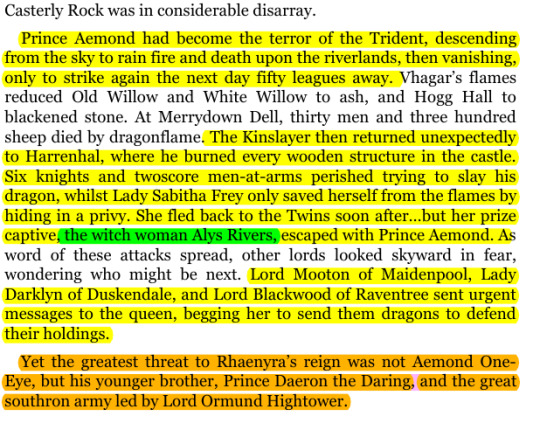
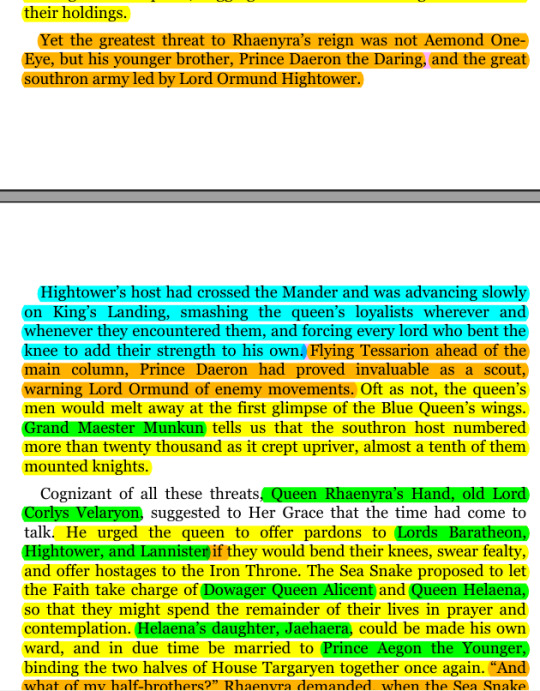
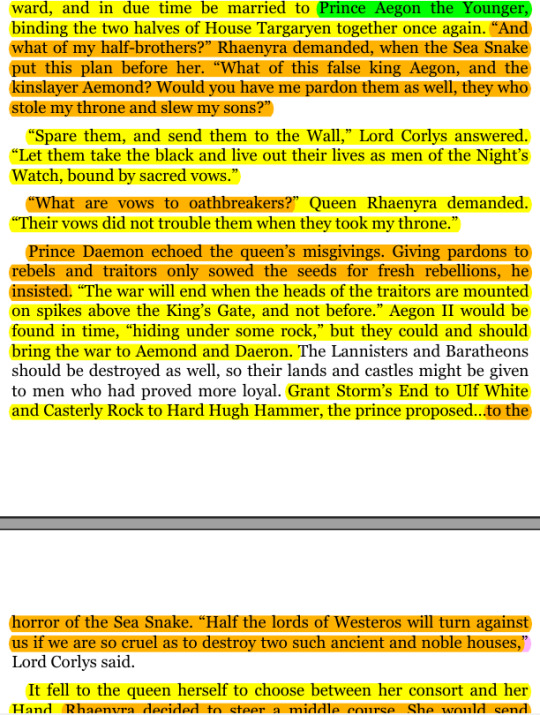
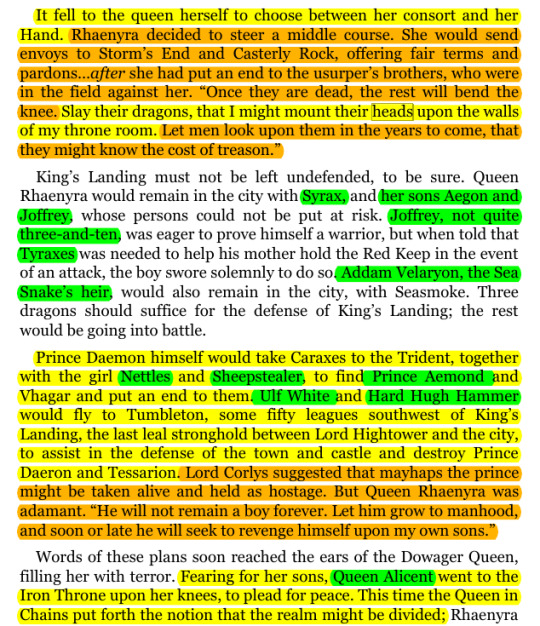
("Rhaenyra Triumphant") -- Second Incident (Rosby & Stokeworth)
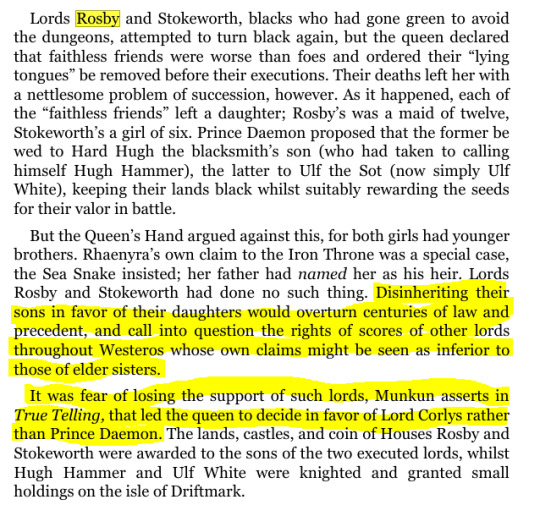
Corlys held her naval support. And while yes for the sake pf setting a precedent of girls becoming lady regnants of houses or being considered as possible, more viable heirs, Rhaenyra ALSO has to measure if she can keep those supporting her to destroy the obstacles in her way so she can ascend and set that prime precedent of female rule. She can't do that if she doesn't win.
If she chose to have these girls become the ladies of their houses, it could have alienated some of the lords she needed to stick with her and support her during an ongoing war. With Daeron-the Hightowers and their army doing well against their own soldiers outside of the city. And she denied Ulf and Hugh the Baratheon/Lannister holdings (correctly) in the next black council when they deliberated how to deal with her brothers, Alicent & Helaena, and those who helped the greens usurp her. She measured the high risks and decided it was way too big in lieu of her other circumstances. (We don't get how she herself felt about it, bc no letters, journal entries, self-reminders, no notes...)
The bulk of her argument for being queen was that the past King/monarch chose her, not that her womanness made her a needed ruler. This is our/the reader's argument. What about the person who must do the actual thing of becoming the precedent, though? There are still material steps to be made towards that. While I would love to see a woman choose to take on that risk, I understand it as the risk it is, what world she grew up in, her limitations, etc.
As Rhaena the Black Bride/Dreamfyre's rider could have been much "nicer" to her kids, she wasn't because of extentuating circumstances--where her own family isolated her despite how they essentially made sure she herself couldn't ascend, how she already proved her loyalties, how she was abandoned by her mother, and how she endured Maegor raping her. Rhaena, who also faced patriarchal violence and is blamed for not "rising above it" by fans. Rhaena is better written--her psychological distress much more comes across as organic bc: the distress does that stop her from seeking and achieving revenge against Androw Farman and even Maegor in various ways and levels and it doesn't or stop her from actively trying and sometimes succeeding in making her and her kids' situations better--but this one element of being trapped in the world you are born into with limited options holds true for Rhaenyura. At least with Rosby/Stokeworth and how she intended to deal with her brothers/their supporters.
And the pressure, again, of the stolen treasury, threat of her brothers still out there, two sons dead violently and her unable to bury either of them. Everything of this happening all at once...I maintain that it would have raised more faith if GRRM made her do the Dragonseed bit herself or more events where she took the lead, but that doesn't mean that since she is the final decision maker that we/GRRM should totally erase how this would cause more of a mental toll on her versus Daemon or Corlys. It's just that he refused to write more events showcasing Rhaneyra's getting back into the "game", so to speak. To show any trace of the clued education and resilience SOONER and MORE OFTEN before Jace dies. Those things that he himself clued us in on from the pre-war era, in favor of letting his male characters shine.
Still, Rosby and Stokeworth was an actually difficult conundrum of a rock and a hard place.
*[6/1/24], END*
B)
and he might still be alive!
That's more legend/fandom wishful thinking. He's definitely not alive. But yeah, he's male and an active one in the war so he gets a legend.
Why don't Visenya, Rhaenya and Alysanne all get "legends" of their own? Because Visenya and Rhaena conquered Westeros w/Aegon while acting as pseudo-Queen Regents/Regnants, apssing laws in the realm they constructed. Instead of just being his consorts. As his consort, Jaehaerys I allowed Alysanne to give suggestions and critiques, but she never actually made or passed or enforced laws; while without her many laws wouldn't have been made or they wouldn't have been abolished, she is also still Jaehaerys' consort without any "hard" political power required to directly change structures in Westeros without having to persuade Jaehaerys to do so. It's part of the decline of female non-militant autonomy and direct authority (which came with the Targ assimilation into the comparatively more violent, abusive, and restrictive Andal patriarchy) that was beginning to rise again with Rhaenrya becoming heir and given that male-designated power...until she's usurped.
C)
even Aegon managed that in getting Dragonstone to defect
However, anon, Aegon actually didn't accomplish the Dragonstone thing. There is no indication that he orchestrated or planned in detail how to take Dragonstone. That was Larys and the men who actually took it for Aegon while he sat up in the cliffs of Dragonstone. ("Rhaenyra Overthrown"):
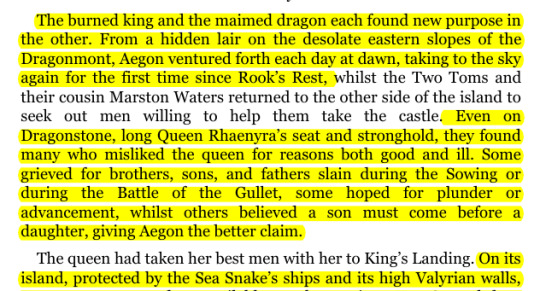
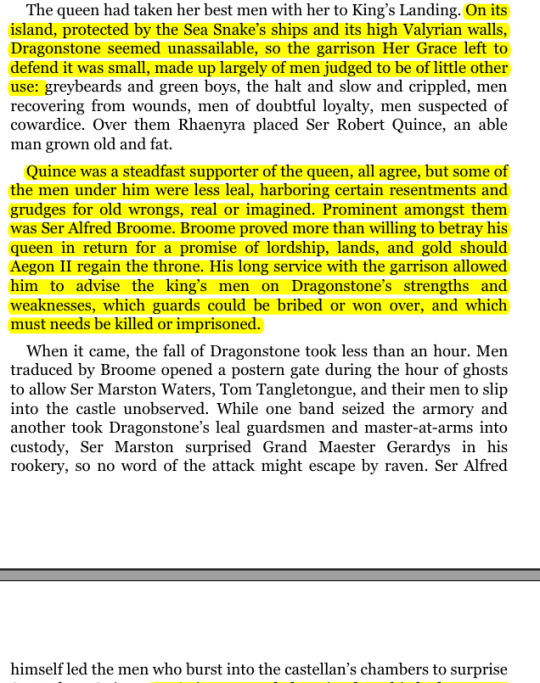

And the only other moment where one could say he displayed some leadership--Rook's Rest--when he decided to fight on dragonback, it was a terrible plan he ended up flamebroiled, which shows how Rhaenyra was better staying out of the battle not already being battle trained herself. Again, we have no indication that Aegon was much of a warrior, like how Viserys was not and Daemon was. Because he rushed too much and wanted to hammer his opponents out of aggreived impatience, partially due to his son getting killed and more so because his ego needed him to show how he can beat the other side and annihilate them. He loses his temper several times at Otto until he dismisses him for Cole's more aggressive approach ("The Red Dragon and the Gold"):
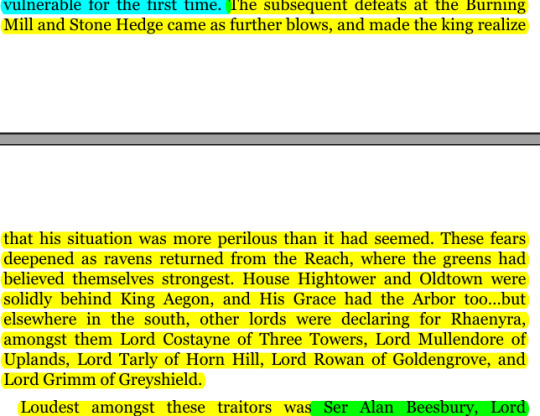

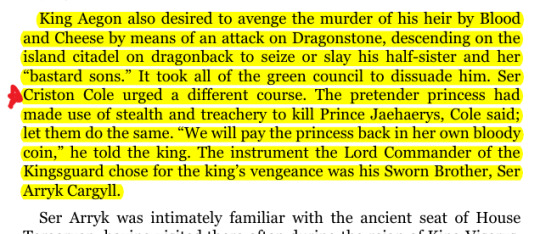
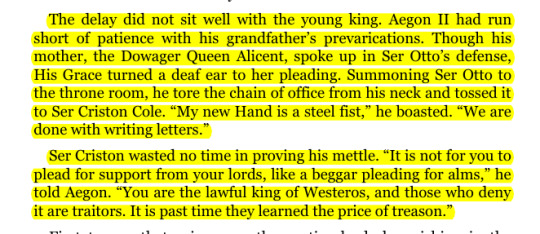
D)
Caraxes is an “old, fast, clever dragon” who helps win Harrenhal without a fight and kill Vhagar, while Syrax is a lazy dragon who mainly exists to get Joffrey killed and then die in the dragonpit (even Sunfyre is better than her, essentially coming to Aegon’s rescue)
Some theorize that Syrax actually shows what happens when you domesticate your dragons or force them into enclosed spaces for long periods of time. But this sentence and other indications that. Plot-wise, it certainly looks like Syrax is completely useless and yet ("The Blacks and the Greens"):
“That makes four dragons of fighting size,” said Rhaenys. Queen Helaena’s twins had their own dragons too, but no more than hatchlings; the usurper’s youngest son, Maelor, was possessed only of an egg. Against that, Prince Daemon had Caraxes and Princess Rhaenyra Syrax, both huge and formidable beasts.
AND
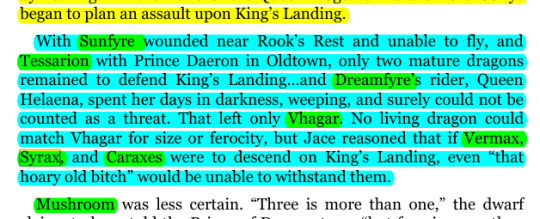
Where's she planned to be a part of at least the KL takeover and ambush if not be the last point of a line of dragons bc the monarch must always be protected...but GRRM makes it so Rhaenyra hangs back for some woman-specific physical reason or other: recovery from miscarriage AND grief or just her anxiety over her sons' deaths.
And Syrax lays many, many eggs that are stored for future Targs--more than other female dragons have been known to. I wouldn't call her completely "useless", it's that she wasn't used for war -- against, that maternal element that feels insufficient for wartime, at least as the only thing she's doing for the blacks.
("A Question of Succession"):
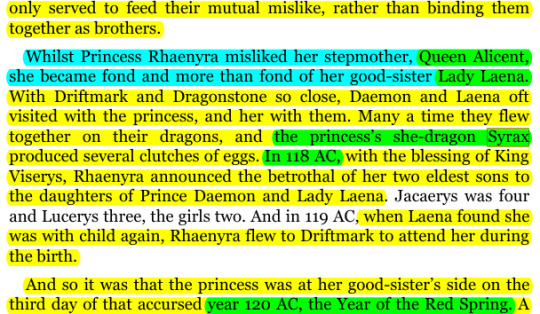
AND
("The Blacks and the Greens")
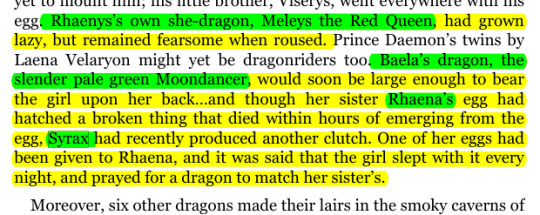
On the one hand, yay, more dragons and the symbolism of fertility and women being the center of Targaryen magic and prosperity and Rhaenyra is very happy to birth her final two boys and she wanted her Visenya. All definite heirs to the dynasty...
On the other, it seems as if GRRM is also maintaining a binary between female reproductive labor vs masculinized military labor (not just swordwork but tactical, strategy, logistics, etc.). Canon!Rhaenyra is what I've called "high-femme" in presentation and lack of knowledge of how to confront through arms (swords, bow-and-arrow, basically anything physical and war-related). I've also often said that Rhaenyra is not and never will be Daenerys Stormborn, who has many gender subversions without being very "tomboy". Like Arya (no, bk Arya is actually interested in "femme" stuff, it's that she's teased and discouraged bc she doesn't act "ladylike" in the Westerosi paradigm of aristocratic femininity). She doesn't have the same sort of background nor the compassion as either of these two, but does have the backbone to not succumb to other's calls for her to give up something they do not think she deserves due to her gender--in the beginning of her life, events before Lucerys' death, and then when she gets to KL onwards. Daenerys is way more complex and interesting, but if anything this is the only thing I can think of that these two women share and it's very important still. (Even though Dany's not a woman-woman.)
And it presents the question of why GRRM didn't allow Rhaenyra to do both and present more to do with her but make her just fail because of very unlucky shit other than the KL stuff? Like her make her strategic, but luck or the green counteract and got the better of her...because it is a fact that she has to die in some way. Not only that, she has to die/lose partly by her own hand, which she does by not getting a handle on the paranoia that's been accruing since childhood (yes) and relying on her class to carry her in a way where it opposes Dany and Nettles' ingenuity and understanding of dragon bonding. But again, that sort of mania, level of loss of senses, and how its used in the story to disable her from participating in some way in her own cause is...crazy and a cheap and sexist shot to make her fall by her own hand. Making her lose all her sons within a short time is dramatic and expressive of the horror of this particular war...you couldn't do that by giving more to your female protagonist things to do as you kill off her kids?!
I'm actually fine that Rhaenyra doesn't directly participate in war-faring as Visenya or Rhaenys or how Daenerys inevitably will--not every person is a warrior or can be, to enact great positive change. Like Daeron II & Alysanne (Alysanne may or may not be a good example bc she may have been discouraged from using Silverwing for that, but we don't see her confronted with this possibility behind closed doors, so...). Not everyone can/should be a swordsperson, archer, etc. What happens when you were not trained in these things, should you be considered "useless"? Or what if you simply weren't good at it?
*[6/22/24]* But she could OR she could have in strategy or logistics or something. But it's like because she doesn't have those of her body with her anymore, her mind must go as well? It's not even that she became "crazy" at the very end so much as she became paranoid and I'm sure that the impression of her going "crazy" was manufactured subtly by Gyldayn...but GRRM couldn't have given Rhaenrya more of a material reason to suspect those around her and not diffrentiate Ulf/Hugh from Addam/Alyn Velaryon/Nettles?! Bc in our eyes and observations, the Velaryons and Nettles' loyalties are undoubtable and she also had some moments of quiet to try to gather herself while at KL to even be a part of many councils and make decisions she had the capacity to think..., so why does Rhaenyra so easily suspect them even with the hanging deaths of her kids over her head? This is still a fictional piece of work; GRRM had options and we know he's creative enough. How this is all written without even a rumor of how Rhaenyra reasoned more Dragonseeds would betray her, unless this is just lost to history AND it is Gyldayn/other maesters before him doing dirty work?
Perhaps this is another reason why I really don't mind a little rewrite here for Rhaenyra, as long as it's written well and I don't trust these writers of HotD for a sec to provide a nonsexist reason for her turning on the Dragonseeds. *[6/22/24], END*
And then there's the definition of a warrior to be discussed: Rhaenys the Conqueror was still war-faring on Meraxes, Meraxes was her war device as much as Vhagar and Balerion were for the sword-wielding other two. It is Andal parameters of "warrior" that has labeled Rhaenys as not one even as she, on a dragon, burnt people at the Field of Fire. Do we not consider Air Force to be "warriors"--well Americans and those in the military have a weird thing about Air Force vs Marines vs yada yada, but again that might (probably) be patriarchy at work. Either way, in this case, yes Rhaenyra could have at least done the Rhaenys thing and stayed on Syrax burning people alive. So I fine with this happening on HotD as well. There's interesting commentary to come from that that GRRM refused to indulge.
Honestly, I don't know. To me it has to do with what the former brideoffires/Twitter's danylanzhou has said about Nettles and Dany, how Rhaenrya did not have what they describe and how GRRM actually went way too hard in the paint for that. but that's as much as I can say.
Do any if these graces make her a more active OR complex/interesting character to read as we are given? Not really. Again, not without PoV chapters or at the very least letter or journals or something(s) she wrote for reflection if she was ever interested in that, IF GRRM just refused to just give her more stuff to do. It's as disappointing as when some Shakespeare fans describe their extreme disappointment with how Merchant of Venice contradicts his other play's wittier and more...compassionate(?) tend to be.
I also still don't like and will never like HotD's Rhaenyra bc they also simply have not developed her with the money they had before the strikes. And now with this DV shit, I definitely will never like the writing for her...because how the fuck is she so determined but performs no domestic power against Daemon after ruling Dragonstone for years?!!! How is this "better" and not more sexist than canon?! [@rhaenin-time's post HERE]
So yeah, in this way, HotD is just following GRRM's lead...while not at the same time.
#asoiaf asks to me#rhaenyra targaryen#Rhaenyra's characterization#fire and blood characters#grrm critical#fire and blood writing#the dance of the dragons#fire and blood comment#fire and blood sources#character comparison#daemon targaryen#daemon's characterization#aegon ii#aegon ii's characterization#asoiaf sexism#fire and blood sexism#the targaryens#asoiaf#fire and blood
45 notes
·
View notes
Text



Book Review of A Crane Among Wolves by June Hur (허주은)
Summary: Hope is dangerous. Love is deadly.
1506, Joseon. The people suffer under the cruel reign of the tyrant King Yeonsan, powerless to stop him from commandeering their land for his recreational use, banning and burning books, and kidnapping and horrifically abusing women and girls as his personal playthings.
Seventeen-year-old Iseul has lived a sheltered, privileged life despite the kingdom’s turmoil. When her older sister, Suyeon, becomes the king’s latest prey, Iseul leaves the relative safety of her village, traveling through forbidden territory to reach the capital in hopes of stealing her sister back. But she soon discovers the king’s power is absolute, and to challenge his rule is to court certain death.
Prince Daehyun has lived his whole life in the terrifying shadow of his despicable half-brother, the king. Forced to watch King Yeonsan flaunt his predation through executions and rampant abuse of the common folk, Daehyun aches to find a way to dethrone his half-brother once and for all. When staging a coup, failure is fatal, and he’ll need help to pull it off—but there’s no way to know who he can trust.
When Iseul's and Daehyun's fates collide, their contempt for each other is transcended only by their mutual hate for the king. Armed with Iseul’s family connections and Daehyun’s royal access, they reluctantly join forces to launch the riskiest gamble the kingdom has ever seen:
Save her sister. Free the people. Destroy a tyrant.
Review: [Cruel tyrant is not an exaggeration so there is a content warning in the author's note that indicates the following: rape (mentioned), sexual abuse, misogyny, kidnapping women and girls, sex trafficking, incest (mentioned), violence, murder, animal cruelty, suicide (mentioned), infanticide (mentioned), psychological trauma, and panic attacks.]
Though this story is fiction, the setting and King Yeonsan are part of actual history. June Hur has not tidied up his tyrannical behavior so there are a lot of atrocities to witness in Iseul and Daehyun's path. This does make for a difficult read, but there is also love and strength that shine through. The dedication says, "To those who have dared to be a beacon of light in the bleakest of moments." There are numerous characters who are that light for others and even in the midst of so much awfulness, there is hope. That's what kept me reading.
Iseul's life has turned upside down and she has realized that she had taken her sister for granted. She is out on her own for the first time and is making brave and rash decisions because she seemingly is unaware of how truly risky and deadly her choices might be. Watching some of her actions is hard, but as she stumbles and begins to find her feet, she is also making connections with some folks who are those beacons of light.
It is equally troubling to watch Daehyun make decisions when there really are no actions to choose that feel truly right. My heart was with both of them knowing that they really were doing the best with their circumstances even when there were no good options. And even when they pick a way that seems best, there is endless frustration as they continue to face horrifying loss and disappointment. Many characters in this story, in addition to so many Korean people in that time period, dealt with a feeling encompassed in the word han. In the book it's described as the "feeling of outrage, the vicious urge for vengeance to right the wrong, pierced by the acute pain and grief of knowing our overwhelming odds at ever claiming justice."
Yes, the odds seem overwhelming, but Iseul, Daehyun and their allies continue to fight, sacrifice, and are willing to give their all to try anyway. They are all inspired by the Korean people, their families, loved ones, and the hope of creating a more peaceful place for all. Some of these allies are so wonderful and even though they are side characters, they managed to worm their way into my heart too. In the midst of all of the effort of so many people, there are also intrigues and mysteries to puzzle out so it's definitely a page turner.
Recommendation: Get it now. For those who watch historical K-dramas already, this will definitely be a must read. For others, this will appeal to anyone who enjoys history with some romance and political intrigue. Though it shows a lot of trauma and hardship, June Hur also provided characters that will touch hearts and stay with readers for a long time to come.
Extras:
youtube
Publisher: Feiwel & Friends Pages: 368 Review copy: Digital ARC via publisher Availability: On shelves now
21 notes
·
View notes
Text
Book Review 56 – Three Parts Dead by Max Gladstone

I consider myself a pretty big fan of Gladstone’s, but until now I’d only ever touched his standalone works – I was previously a bit put off by the length of the Craft Sequence and so never actually tried it. So, thank you to the people who recommended I give it a try anyway! Despite being the first in a series, Three Parts Dead is a perfectly fine self-contained story and not relying on you reading the sequels to finish anything important. While it’s not the best thing of Gladstone’s I’ve read (Last Exit my beloved), it’s not the worst, either.
The book takes place in an industrial fantasy setting about a generation out from the apocalyptic, centuries-long war between the old gods and the ‘deathless kings’ – human sorcerers who had learned to master magic such that they could face them and tear the world apart in the crossfire. Tara, the hero, graduated from basically-Hogwarts entirely because there’s a binding preventing the school from doing bodily harm to its students – the next second they literally threw her out a window at 10,000 feet. The story follows her as she’s hired as a junior associate helping a world-famous lawyer/archmage as she’s hired by the church of Kas Everburning to investigate the sudden and mysterious death of their god. What follows are several hundred pages of convoluted scheming, legal proceedings, forensic accounting, and bloody magical duels and assassinations.
There are a few twists I genuinely didn’t see coming, the plot overall hangs together very well, and the pacing was just about perfect for the kind-of pulpy mystery/adventure story it was. Overall just a great time reading it.
That said, the setting’s probably the main thing to really sell people on this book. It’s just fun, and actually pretty damn original. The basic conceits are that a) magic is real, and b) so is capitalism. Kas Everburning is the beloved god and protector of the city, and also a highly leveraged legal entity loaning power across the globe whose death would catastrophically destabilize the global financial/metaphysical/political system. Mages can fly and raise zombies and enscroll people, but it’s all done in the idiom and with the vocabulary of contract law.
Beyond the basic conceit, Gladstone just clearly delights in layering weirdness on weirdness. Vitally, he does actually have a bit of restraint with the exposition – the book’s full of off-hand comments about different places and institutions that make you (me, anyway) incredibly curious about what the hell their deal is, but the actual explanations are restricted to what’s actually relevant to the plot and what the characters actually need to know. I still really want to know what’s up with King Clock or the Iskari or a half dozen other things, though. So, top-tier worldbuilding.
The themes are not exactly subtle, but I very appreciate that Gladstone lets them mostly remain as worldbuilding subtext and manages to make them feel like they emerge very naturally. I appreciate the slight restraint it takes to let the reader draw their own conclusions about the fact that the city’s police force is so empowered by strength and lack of need for doubt when on the clock that it’s literally addictive, or that one of the main antagonists is a brilliant older academic whose masterwork is a system where his star pupils (including a disproportionate number of attractive young women) are magically networked together to achieve incredible results he can take credit for while their lives and personalities are drained away to nothing. Being able to literalize the subtext a bit is half the fun of secondary wrld fantasy, after all.
Anyway, yes, very fun read. Four stars.
48 notes
·
View notes
Text
Things in my ask box #2
Got a new one for the “questions that might catch the poster some flak” bin. The poster asks, “What were you thinking when you wrote ‘The Ones Who Stay and Fight?’“ There was more to the question, but that’s what it boils down to (and I did clarify with the ask-er that this is what they wanted to know most).
I don’t generally like to discuss readers’ interpretations of my stories. Art is subjective, and what one person loves another might loathe, sometimes for the exact same reasons. Also, half the time I don’t even know what I’m doing; sometimes I don’t notice a theme in my work until years later when a reviewer mentions it, or I re-read it long after publication. My mind works in mysterious ways, even to me. But since you asked what I was thinking and not to confirm/deny a particular interpretation, I’ll try to explain.
(First, for those who haven’t read it, Ursula K. Le Guin’s “The Ones Who Walk Away From Omelas” is her most famous short story, and probably one of the most famous short stories in the world. There’s a whole subgenre of responses to it, because it provokes such powerful reactions in readers, and I’m no exception. [I’m a huge fan of Le Guin, if you didn’t know from me screaming about her to anyone who would listen for like 10 years now.] If you haven’t read the story, you should; it’s probably available somewhere online. There are a million ways to interpret the story, and if you poke around for reviews or lit crit analyses you’ll find feminist readings, anti-capitalist readings, mythopoeic/folklorist readings, and more. My story does not make sense if you haven’t read her story; it functions solely in conversation with Le Guin’s. Think of it as fanfic, if that helps.)
I’m not a literary scholar and I don’t pretend to be, but I’ve always leaned into the anti-capitalist reading of “Omelas.” Anybody who’s reading this in the developed world is already living in Omelas. Every time we buy a pair of Nikes, we’re contributing to sweatshops, child labor, migration crises, pollution... our own version of the abused child locked in a cellar. No ethical consumption under capitalism. Also, I lean anti-capitalist with “Omelas” because I think often of this quote by Le Guin:
“We live in capitalism. Its power seems inescapable. So did the divine right of kings. Any human power can be resisted and changed by human beings. Resistance and change often begin in art, and very often in our art, the art of words.”
Bad. Ass. I want to be her when I grow up.
That said, when I decided to respond to this as a writer -- by writing back to it -- I was more interested in anti-racist readings of Omelas. Those interpretations don’t seem to be as popular, but at the time I wrote my story, I was trying to process the absolute bombardment of open racism and every other kind of bigotry that seemed to be metastasizing in the wake of Trump’s election. I pondered the world that these people seemed to want: a world of war and endless suffering, doomed to end in extinction for us all (tho some believe Jesus or Jeff Bezos will whisk them away before things get too bad). I wondered what it would take to come back from that world, if we went down that path but managed to survive as a species. So to my mind, Omelas works well as a metaphor for conservatives’ (and fascists’) endless fantasies of the world that was, in which everything was wonderful before the “corruptions” of liberalism destroyed it -- corruptions like equality, diversity, intellectualism, religious freedom, and democracy. This is the “again” that the “make America great...” people embrace -- a “better” world that never existed. We all know that in the 1950s, there were plenty of kids in cellars, worse than today: BIPOC kids, queer kids, disabled kids, poor kids. If America’s wealthy and powerful get what they want, they will get to live in a utopian fantasy; the rest of us go in the cellar.
The society these people want is one that further-codifies the idea that some people are lesser. Some people aren’t as fully people, basically, and therefore don’t deserve rights, basic necessities, compassion, or life. Therefore I decided to make my “utopia” (scare quotes because, like Omelas, Um-Helat really isn’t) an anti-bigoted society, which has instead chosen to codify the idea that no one is lesser. Instead of its happiness depending on limited oppression, I wanted my “utopia” to depend on limited suppression of that insidious idea.
Suppression is no better than oppression, by the way. We’re used to oppression, so maybe it doesn’t seem so bad... to some. But both ways of maintaining these not-quite-utopias require harm to be done to some for the benefit of others. Omelas chose to limit the harm to a random child, and to a lesser degree to all its citizens, who must morally compromise themselves in order to enjoy their lives. Um-Helat chooses to limit the harm to those who’ve internalized some people are lesser -- the intolerant, per Karl Popper’s paradox of tolerance -- and to the “social workers,” who must morally compromise themselves in order for the other citizens of Um-Helat to thrive. I was also playing with the idea that there’s nowhere to walk away to. Imperialism and capitalism have made pretty much the whole world Omelas, in real life. So how does any society grapple with its own complicity with evil? Omelas is better off than our own world, and Um-Helat, because people can walk away, there.
It’s entirely possible that I failed to do what I tried to do with this story -- first because I tried to do so much. “Omelas” is a deceptively simple argument with deep, complex points being made; my attempt to answer had to cover a lot of territory. Second because Le Guin was a master of the short form, while I’m pretty much a dabbler, and third because this was also my first time trying pastiche, and it probably shows. But I believe in shooting my literary shot, hit or miss, and I’m glad that I did. It turned out better than I expected.
So that’s what I was thinking. ☺️
#damn it these always get so long#clearly I've missed longform blogging#answered asks#short fiction#the ones who stay and fight#the ones who walk away from omelas#Ursula K. Le Guin
136 notes
·
View notes
Text
Books I Read in 2024, #19 to #22: The Apothecary Diaries, Volumes 4-7 (Natsu Hyūga with illustrations by Touko Shino, published by Shufunotomo, English translation by J-Novel Club, 2021-2023)
[tk photos of volumes 4-7]
Apothecary to a red light district house of courtesans, Maomao is embroiled in mystery, conspiracy and murder plots a-plenty throughout her time in the emperor's court and even after her service in the inner palace.
For those of you who follow the anime, this will contain spoilers for future seasons (each full season adapts 2 volumes, one each cour, so beware.
Content warnings for discussion of the death of a loved one, as well as general warnings that would apply to the story (Chinese court intrigue, sex work, poisoning and murder). If you want to skip the first content warning, skip to the first segment of large text below the readmore.
Do not message me regarding the first half of this, even if you think you're offering condolences. Even if you're my friend. I'm serious.
Thank you.
It's been awhile. I went and looked and my last reading list post was 09/09/2024.
This is your last chance to skip to the book review. I'm gonna write about something that's may be hard to read. If you don't want to read about my mom, skip down to the bigger text further down.
On September 29th, 2024, my mother died of acute heart failure. Her birthday was 10/25/65, and she was 59.
It was hard to do anything for awhile. I felt dazed, still do when I think about it for too long or too much. I feel intensely lucky that I got the chance to say goodbye in the hours before she passed, on bypass and barely conscious. Dad never once left her side until the end.
Mom was my role model for much of my life. Smart, brilliant even, starting out as a pharmacy technician in the late 80s and pushing herself up through home infusion until by the end of her career in 2007, when she was the general manager of the San Antonio branch of her home infusion company she worked at for nearly 20 years. Before she was general manager, she helped design and build out a pharmacy system for home infusion that was so good at what it did that it was bought by Walgreens and still used to this day.
She gave me an infectious curiosity about the medical field and a love of reading that she fostered by treating me like a person, recommending me books and asking me about them afterward, talking about them seriously. She gave me a love for Stephen King that expanded everywhere, from middling 90s litfic and the greats (lord of the rings, the stand, the dark tower, redwall, too many more I'm surely forgetting as I write this) to leaving me to make my own way and find my own taste (not good for awhile, as evidenced by my deep reading of every Star Wars EU novel I could get my hands on) for myself.
In 2007 she was diagnosed with degenerative disc disease, a structural issue that causes the structure of the intervertebral discs of her spine and elsewhere to degrade and compress over time, leading to hideous, painful grinding of spinal vertebrae that left her first partially and later almost completely bed-bound. She was 42, hideously early for such things at the time, and lived in San Antonio, one of the orthopedic capitals of the US thanks to the presence of multiple military hospitals treating soldiers in need of radical surgery.
The first surgeon she saw told her that her chances of recovery with a fusion of the affected vertebrae (removing the destroyed, ineffective disc and welding together the vertebrae with bone grafts to form a single vertebral segment) has about a 50% chance of failure, meaning she would continue to experience debilitating pain (months of therapy and pain medication did not make a dent, and she was on medical leave by then, unable to perform even simple desk activities for 8 hours at a stretch) for likely the rest of her life.
The second surgeon took her hand and said "I can fix you."
She attended my graduation from high school with a walker, nearly blind from the pain of sitting through the ceremony. I dropped out of college to care for her, until things had stabilized enough that I could work and pursue my own life. Through it all, my dad was by her side, her closest friend and her rock.
I'm not going to eulogize her disability, the years of pain between then and now. I want her to be remembered as woman she was despite it. Kind and funny, always ready to offer advice or an ear to the people she loved. She made me the person I am, and having her ripped away from me so suddenly tore a hole in my heart that still bleeds now.
Love you, mom.
Apothecary Diaries is a comfort food for me in a lot of ways.
I first read the first 3 volumes shortly after the anime started, finishing volumes 2 and 3 before the first season, which covers the first volume was complete. I instantly connected with Maomao and the cast, but her most of all.
Light novel Maomao may be my favorite unreliable narrator, because she's been raised and trained in an environment of strict propriety while also living in a world much less bound by it than the broader society; she walks effortlessly between the straightforward, downright honest underworld of highv(and low) class sex work and the highest inner palace, serving women who are both courtier and sex workers in their own rights as the emperor's consorts, where the slightest bit of insubordination can result in beatings or beheading. And despite a forthright, absolutely mean streak that runs down her, she also knows when to hold something back, and often finds herself having enough knowledge to say something is happening but unable to speak it, to protect both herself and the poor sap unfortunate enough to be tangled in the latest mystery.
What makes Maomao Maomao for me is that even as she's a barely-socialized feral cat, she's deeply, keenly aware of people and all their flaws and foibles, and she's deeply unaware of her own feelings. That's a great, fun combination. She knows Jinshi likes her likes her by Volume 4, and she's doing her goddamn best to not be beheaded for being the slovenly commoner the prince is batty for. The only person she sets propriety entirely aside for is her father, to hilarious effect.
I won't lie, part of why I came back to these stories was Maomao and her father's relationship. It's hard for me to not see a little bit of a parallel between myself and them; Maomao was forced to leave Luomen behind by the events of the story taking her in the palace, but we get much more of him in the later volumes, and it's hard for me to not see comparisons between my own mother and a man disabled and hobbled, who Maomao is keenly aware of the limits of and does her best to accommodate.
The mysteries aren't always accessible to the reader, because much of Maomao's inquiry is extremely circumspect, but it's done in a way that invites curiosity about the circumstances, leaving you some room to guess at what medical knowledge may be required here. The facts are the facts, but interpreting them is the issue, and Maomao feels deeply that she needs to base her actions on facts and not belief, thanks to her father. A great attitude, but one that makes her difficult to read, because she is so quick to decline to state anything directly when the mystery is afoot.
Volume 4 is wild, pivoting hard halfway through in a way I didn't expect after the fairly conventional inner palace mysteries of volumes 1-3 (though 3 does a bit of this too, it was very late for it). I quite like seeing more of the city for the remaining volumes, and the new characters are, for the most part, very interesting. The building broader plot of Volumes 1-4 ends well, and the new story elements of 5-7 as things move outside the inner palace and the courtesan intrigue into broader geopolitics are great fun.
I'm deeply interested in seeing the anime adaptations of the later volumes, and dearly hope it gets more than Season 2 (cours 3 and 4, adapting volume 3 and 4, are coming soon), because there's a lot to like about the adaptational choices they've made in the previous season, and I hope we get to see a lot more Maomao, and especially a lot more Jinshi. I left him unmentioned because a lot of stuff happens I wouldn't want to spoil, but Jinshi remains an absolute highlight, and I can't wait to see people's reactions to him from here on.
4 notes
·
View notes
Text
The TV show Mary and George premiered in the UK and has gotten some good reviews which reminds me that i read The King's Assassin by Benjamin Woolley, the book it's based on, back over Christmas break and I should stick my thoughts here for posterity so I can compare later
So the political machinations and scheming and gay drama in the court of King James VI and I is some really interesting history and I have to say I did enjoy reading the sections that are just really wild historical anecdotes (George Villiers and James's son, Charles, go on a TRULY wild road trip to Spain in an attempt to secure a match for Charles that has a truly comedic and jaw-dropping number of ridiculous problems and I had a fantastic time relaying that story to many people)
It seemed clear to me that Woolley did his research—there is an extensive list of primary sources included at the back and his understanding of how James’s favorites played into the broader political and religious maneuvering of the time is very thoroughly laid out (there is a LOT about parliamentary meetings and promotions and papal dispensation)
What I thought was weird about how the book is advertised is that the title and description HEAVILY emphasize that Woolley has new cutting-edge evidence to prove that George Villiers assassinated King James which is a) not actually a huge part of the book (literally the epilogue, maybe 20 pages out of almost 300) and b) not…that convincing?
Certainly there’s a LOT of ruthless behavior done by the Villiers family and the political environment of the time is one in which assassination, even of the king, is totally on the table, but Woolley’s new evidence is that he…described the situation to a forensics expert who said he thought James had been poisoned while being treated for malaria? That’s it!
And like, cutting-edge medicine of this time literally included “smearing brick dust and oil on the king to cure him of gout” so I’m not convinced that James wasn’t just killed by a bunch of 17th-century physicians just not knowing how to treat malaria TBH
Also how do you even get malaria in 17th-century England…?
I think when you’re analyzing the death of a king from the 17th century you can’t really rely on forensics to prove he was murdered because you can’t exactly do an autopsy, and I think if Woolley wanted to convince me that Villiers murdered the king he should have backed it up with some solid analysis of why Villiers would have murdered the man who raised him up from a backwater noble second son of a second marriage to one of the most influential men in England and the most Woolley managed was “well maybe George Villiers and Prince Charles liked the vibe of how monarchy functioned in Spain [a country they were in active conflict with at this time so I feel like would not have been a role model??] and murdered James together so they could create a new monarchy” which is literally introduced in the final paragraph of the book (that is a very silly way to organize your argument)
Also I was unsatisfied by how Woolley analyzes the queer aspect of the history he's discussing
It’s not that the book no-homos the relationships between King James I and his “favorites,” because Woolley does clearly understand these relationships were romantic/sexual even if these men were both married to women and had children with them, but the book seemingly has no interest in analyzing what it means for the king of England and Scotland to have fairly public relationships with men in a country in which sex between men could be considered a capital offense punishable by death and I was frustrated by the fact that Woolley simply doesn’t touch on how the relationships and historical figures he’s discussing in his book fit into queer history, it seemed odd to not touch on it at all??
Also, this book taught me that the novel Red, White, and Royal Blue by Casey McQuiston is incorrect for saying that King James met George Villiers at a jousting tournament! That was Robert Carr, James’s previous favorite who Villiers replaced (George Villiers met James I because he was a cupbearer at court).
My ultimate analysis of the book was that I think the history it's drawing on has the possibility to make a REALLY fascinating TV show but I thought the book was not improved by some weak analysis of James's possible assassination
Also, I am very excited that Julianne Moore's Mary has a high billing in the TV show and seems to have a lot to do because I found her a very fascinating historical figure (she tried to steal bales of wool from her second husband to sell for her own profits and when she was caught just said she needed the money to pay off debts!), but she basically drops out of Woolley's book once George is instated as the king's favorite
If this show is good I am going to be so annoying about it and I'm not sorry
#the roadtrip story is really so funny i should find my notes on that#lulu speaks#lulu reads#lulu reads the king's assassin#the king's assassin#books#mary and george#history#lulu talks history
10 notes
·
View notes
Text
Dragon Ball Z: Abridged – Plan to Eradicate Christmas Review
Originally posted... today!
Instead of the true meaning of Christmas, we see the true meaning of an abridged series.

Over the course of Dragon Ball Z: Abridged, Team Four Star has established a lot of minute details about its characters. We saw in Christmas Tree of Might that Goku is earth’s most ardent defender of Christmas. We also learned that across the universe, very few people got to celebrate Christmas, as it was replaced by Freeza Day on any planet he conquered. And we learned that even before Freeza conquered Planet Vegeta, Santa was never able to visit them to spread love and good cheer, because the Saiyans tried to shoot him down.
Every single one of those details is capitalized on here in Plan to Eradicate Christmas. Through snippets of character interaction, we learn that Goku has been itching to defend Christmas yet again. We see Freeza’s ego displayed as he commands the Villains of Christmas past to referthemselves as the Villains of Freeza Day Past, despite them having agreed upon Christmas. Even Santa’s inability to deliver presents to Planet Vegeta is called back to, as Vegeta nostalgically recalls his favorite Christmas pastime of shooting energy blasts at Santa’s sleigh.

If these callbacks rested solely on referring back to things we already know, it’s possible that they could fall flat, but every single one is rooted in the nature of these characters we’ve come to know and love. Of course the violent egomaniac Vegeta would try to shoot down Santa’s sleigh. Of course Freeza would refuse to bow to the demands of Cooler, Turles, and King Picc…Lord Slug, who he all views as his lesser. And of course, the battle hungry, ever optimistic Goku would be salivating over another opportunity to save Christmas, his most wonderful time of the year.
The specificity of these characters is also what makes Santa work so well as a villain here. After our heroes defeat the Villains of Christmas Past, they are confronted by Santa, who reveals that all have been naughty and fallen short of the glory of Santa. Vegeta is, well Vegeta, we know what he’s done. Goku’s lust for battle endangers the entire universe, brought to the forefront with a perfectly timed ad for Dragon Ball Super, and Piccolo is held to account for his and his father’s past attempts at world domination.
Even Trunks is at fault, having time traveled so recklessly as to endanger the space-time continuum, brilliantly highlighted with a cut to what I believe is Dragon Ball GT footage. Only Gohan is without naughtiness, and is granted a present by Santa, but like every Christmas before, Santa gives him what he likes, and he likes books.

The jokes in this Christmas special all land so well because they draw on our understanding of these characters, who we’ve gotten to know over the course of the last decade Dragon Ball Z: Abridged has been produced. It’s genuinely delightful to see Team Four Star tackle a Christmas special once more as well, as they manage to turn a story from an uninteresting OVA with a generic villain into a hilarious Christmas romp.
Plan to Eradicate Christmas is a great example of what abridged series can do at their best. They can take weak ideas and repurpose them, giving them new life and meaning with a comedic edge. Team Four Star really did go and give us a gift in Christmas 2018, and showed us what abridging is really all about.
Rating: 4.5/5
Stray Observations
I would be remiss if I didn’t mention the fantastic music Cliff Weinstein composed for this special. Christmas Eve-olution / Carol of the Hells is the standout track in particular. It is wonderfully ominous and builds perfectly to the final confrontation and group Kamehameha.
Thanks for reading! You can support her continued film criticism addiction on Patreon.
#dragon ball z abridged#dragon ball z#team four star#tfs#dbz#dbza#dbza special#dbza eradicate christmas#the first piece of new writing on this blog in four years#it feels good to be back :)#can't help but wonder if there is going to be something new up here next week as well#who could possibly predict such a thing?
36 notes
·
View notes
Text
A Review of my time in Skyrim's Prisons (Featuring Some Followers): Cidna Mine
This is it.
This is the last in my series reviewing the prisons of Skyrim's hold capitals. Our topic this time is Cidna Mine, easily Skyrim's most infamous jailing facility. My experience in this prison is a large story filled with the good and the bad. So, how does the big daddy of Skyrim jails compare to its peers?

For the first time entering a cell, I was greeted by a staff member and told what was expected of me explicitly. She made it clear that this prison prioritises punishing prisoners with manual labour for the benefit of those in power than any form of rehabilitation. This idea is present throughout the prison itself. My greeting room (which doesn't function as a room for individuals) was only decorated with the essentials for its function. A table and sac containing items unknown. It was here that I was temporarily separated from my associates. The key word there being "temporarily"...

Sofia, who hadn't had her equipment removed (my associates' abilities to not have their things taken continues to baffle me) quickly found my location and then proceeded to show off a new skill of hers.

This woman, in all of her drunkenness, has somehow managed to master the incredible magical art of phasing through cell doors. She didn't pick the lock, she didn't teleport, she phased THROUGH. THE. DOORS. HOW?! I was shocked, and somewhat still am. She still refuses to share the secret of this ability to me to this day.


…Which made it all the more annoying when she almost immediately proceeded to do it again, all without explanation. Sometimes this woman confuses and frightens me.

Putting aside Sofia's ability to defy the very existence of metal cage doors, we were shuffled down into the main open space of the mine. A small fireplace illuminated the dark cavern, littered with pickaxes all throughout for prisoners to use to earn their very survival as the man pictured sitting at the fire told us is the case. What is plainly visible in this prison is function over fashion. The open space is able to account many prisoners at once and the lack of any proper seating/ bedding reinforces the core message of the jail. These prisoners are meant to suffer.

Moving more directly to the left we observe a more dimly lit path filled with ore veins, teeming with silver. A wheelbarrow is handily provided for prisoners to kart any silver they dig up, displaying a degree of efficiency not always seen in Nord mines.

It was while returning to the central cavern that the rest of our team reached our location. Inigo's superior sniffing service allowed him to pinpoint where in the prison I was and rally our friends to regroup. This made navigating the mine and escaping it simultaneously easier thanks to greater collective strength and harder as my friends would often block vital narrow hallways.

The opposing side of the mine was far more cramped than the first, with plenty of loose pickaxes scattered about. Under normal circumstances I'd say the liberal scattering of pointed cold metal tools would be unsafe for prisoners to be around, but seeing as the powers that be clearly do not care for the safety of prisoners at all and very rarely check on them it's not that much of an issue. After fully exploring this side of the mine, I was presented with the question of how to leave the mine.

Uraccen, a prisoner in these mines for many years that was as skinny as a pickaxe's handle and as pale as the snow was very helpful in providing insight as to the culture of prisoners in Cidna Mine, while also pointing me to someone who could aid in my departure from the mine. Madanach, a Forsworn leader who had been orchestrating the terrorist attacks on Markarth from inside Cidna Mine. However, reaching the "King in Rags" required getting past his guard dog.

The brute in question, aptly named Borkul the Beast, was built with a greater toughness than the rocks he leaned upon and a face that not even a mother could love. He guarded the door to Madanach's private room and looked to be a tough nut to crack. In all actuality that couldn't have been further from the truth. All I had to do was lie very slightly to convince him to let me through for an audience with the King in Rags.

Madanach's private space was, in stark contrast to the rest of the mine, was lavishly decorated with a full single bed, a storage chest (or potentially a prisoner belonging chest that may or may not contain Boots of the Old Gods), a desk with chair, multiple barrels, a rug to comfort the feet and plenty of food and drink. This abode is highly luxurious and clearly highlights the special treatment Madanach receives from his arrangement with the Silver Bloods. It highlights how willing the staff operating Cidna Mine are to go the extra mile for their prisoners (assuming said prisoners are high ranking members of the Forsworn with great influence over a native culture that is).
Madanach indulged us with his history, as well as that of many of the prisoners in the Mine. His story is one of oppression, corruption and injustice; three traits that the stories of many of his cellmates share also. In this our group understood the gravity of the Markarth conflict and made a mutual decision to aid in the escape of the prisoners of Cidna Mine so as to deal a blow to the corrupt sphere of Markarth. Before fully accepting our co-operation though, Madanach had us prove our loyalty to helping his cause by... eliminating one of the prisoners.

I took no pride in his assassination. As the smell of cooking flesh entered my nostrils and the emerald embers spewed from his cadaver I fought internally as to why Madanach had felt this a necessity. While yes, the man was beyond a point of benefiting his cause, killing the poor man felt like a betrayal of what Madanach himself had preached only minutes ago. Either way, the deed was done. The poor sap had ascended to Aetherius and I finally had a chance to show off the cool looking green fire magic I had learned, so I suppose it wasn't all bad.

It was after this that Madanach had stated his need to address what prisoners weren't currently burning to a chartreuse crisp in a riveting pre-escape speech. A great idea... were it not for the brief instance of mental rot he experienced on his way there that saw him compelled to forcefully walk into a wall of the narrow hallway between his room and the main cavern. I am unsure as to the explanation behind such brain rot, but the nature of the walls of the hallway were found to be very intriguing by Teldryn, who proceeded to stare blankly at the opposite wall for multiple minutes (perhaps some latant, ancient Dwemer magic at play?). Both did eventually regain their senses, but not before some gentle...ish prodding from myself.

The King in Rags addressed his subjects against the light of the central fire, its flames pitiful versus the fires of ambition in the hearts of these men. Were they not about to commit multiple counts of murder as they escaped the city I would've felt inspired. Now I just feel somewhat dirty.

An outcove of the narrow hallway connecting the central cavern to Madanach's quarters contained the site of a Dwemer ruin, one running in connection with the city above us. Knowing what dangers lie within such ruins from experience, our team steeled themselves for the dangers that may have laid ahead.


The first hurdles we encountered were some particularly large Frostbite Spiders who had nested inside the ruins (not pictured above because my girlfriend reads these posts and is afraid of Frostbite Spiders). They proved surprisingly resistant to being burned to death by my green fire spells, but were no match for my teammates' steel.


Traversing deeper into the ruins presented us with greater volumes of Dwemer steam technology, from heavy piping to active Dwemer Sphere units that posed a danger to me, for the rags I wore aren't exactly Ebony quality. Once again, my allies proved invaluable in defeating the threats before us. I only wish I could have helped more.

It was soon after that the prisoner convoy reached a halt before the exit out into the city proper. Madanach took this time to take me aside, thank the team for assisting in his cause, returning my items to me (where he got them from I'm not certain considering the evident lack of a prisoner belonging chest in my case) and presenting me with the Armour of the Old Gods (See? I knew it was in that chest from earlier!) before leading his forces outside, where my friends and I quickly followed.

Awaiting us outside was the lord of the Silver-Bloods, Thonar, with multiple city guardsmen at his side. He challenged Madanach and his allies in broad daylight and tried to put an end to the Forsworn uprising in the city.

A massive fight ensued. Spells and swords clashed in this tiny corner of the city as Nords and Bretons fought valiantly in battle for their beliefs. We decided to refrain from getting involved in the fighting in this case (much to Sofia and Jordan's disappointment). Not that the Forsworn particularly needed our help. They mopped the floor with Thonar and his men.

No, as in they quite literally mopped the floor with Thonar. an interrupted necromancy spell saw the Silver-Blood's corpse reduced to an ash pule which was brushed all over the steps of the city. This combined with all the Nord blood staining the floors proved the Forsworn did LITERALLY mop the floor with the Nords.

Soon enough the battle was over, and as what was left of the guard saw to the dead and injured I was left to reflect on my time in Cidna Mine.
Overall, Cidna Mine is an exceptional jail that has effective staff, a strong and open layout, knows what it wants to be, generates a passive income through silver mining and great luxury (provided you are a Forsworn leader). Escape is also effectively deterred by the natural denizens of the dwemer ruins that connect the city streets to the mine. Although, I do take issue with the strong lack of prisoner observation and the multiple exit points the mine has out into the city. Those limitations place it short of The Chill in my personal rankings (which may end up being a post on here later), but still very much in the top echelon of Skyrim's jails.
Final Score: Nine Boots of the Old Gods out of Ten Boots of the Old Gods.

Aaaaaaand that's it! Thank you for reading my prison review series and (hopefully) enjoying my perspectives on these locations. I'm sorry some of them took a while to make (mental health's a bitch, am I right?), but I intend to post more often now on Tumblr. Mostly shitposts and memes and whatever comes to mind (most of which will be Skyrim stuff)
THANK YOU!
#skyrim#tes v#tes v skyrim#skyrim prison review#inigo#inigo the brave#sofia skyrim#lydia skyrim#jordan the reikling#cool jail#teldryn sero#markarth#cidna mine#forsworn#No One Escapes Cidna Mine#Madanach#Thonar Silver-Blood#The last of the series#I'm done doing these finally#The Big One#No I'm Not Doing Raven Rock
2 notes
·
View notes
Text
What is Digital marketing and how can we earn from it?
According to me I can offer valuable insights into the field and lucrative earning opportunities. Digital marketing involves promoting products, services, or brands through various online channels, including websites, social media, search engines, email, and mobile apps. Here are some strategies and examples that are working well for freelancers in the digital marketing industry:
Content Creation and Marketing: Content remains king in digital marketing, and freelancers can capitalize on this by offering content creation services such as blog writing, article writing, video production, and infographic design. High-quality, engaging content helps businesses attract and retain customers while improving their search engine rankings.
Example: A freelance writer specializing in technology creates informative blog posts and whitepapers for software companies, helping them establish thought leadership in their industry and drive organic traffic to their website.
Search Engine Optimization (SEO): SEO is essential for businesses to improve their visibility in search engine results pages (SERPs) and drive organic traffic to their websites. Freelancers can offer SEO services such as keyword research, on-page optimization, link building, and SEO audits to help clients rank higher in search engine rankings.
Example: An SEO specialist helps a local bakery optimize its website for relevant keywords such as "best cakes in [city]," resulting in increased online visibility and more foot traffic to the bakery.
Social Media Management: Many businesses struggle to effectively manage their social media presence. Freelancers can offer social media management services, including content creation, posting schedules, community engagement, and paid advertising campaigns, to help clients grow their social media following and drive engagement.
Example: A freelance social media manager helps a small business owner create and curate engaging content for their Instagram account, increasing brand awareness and attracting new customers.
Email Marketing: Email marketing remains one of the most effective ways to nurture leads, promote products or services, and maintain customer relationships. Freelancers can offer email marketing services such as email campaign creation, list segmentation, A/B testing, and performance tracking to help clients generate leads and drive sales.
Example: An email marketing freelancer designs and implements a series of automated email campaigns for an e-commerce retailer, resulting in higher open rates, click-through rates, and conversions.
Pay-Per-Click (PPC) Advertising: PPC advertising allows businesses to reach their target audience through targeted ads on search engines and social media platforms. Freelancers can offer PPC management services, including keyword research, ad creation, bid management, and performance tracking, to help clients maximize their return on investment (ROI) from PPC campaigns.
Example: A freelance PPC specialist helps a startup company launch and optimize Google Ads campaigns, driving qualified traffic to their website and increasing sales leads.
Affiliate Marketing: Freelancers can participate in affiliate marketing programs to earn commissions by promoting products or services through their website, blog, or social media channels. By partnering with companies as affiliates, freelancers can monetize their online presence and audience.
Example: A freelance blogger writes product reviews and tutorials on their website and includes affiliate links to recommended products, earning commissions for every sale generated through their affiliate links.
Ready to take your digital marketing skills to the next level? Enroll now in our comprehensive free online masterclass and unlock the secrets to success in the ever-evolving world of digital marketing.
#digital marketing#masterclass#learn#online earning#affliate#freelance#career#career in digital marketing
2 notes
·
View notes
Text
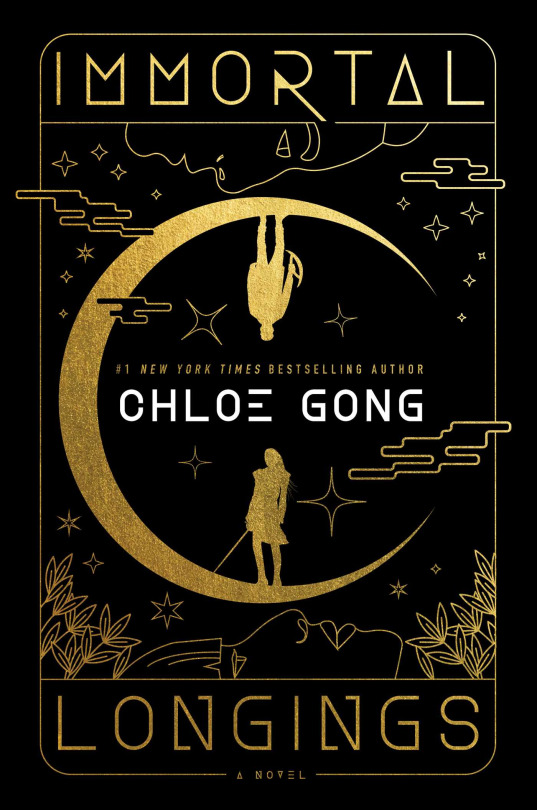
Genre: Fiction, Adult, Science-Fiction, Fantasy,
Rating: 4 out of 5
Content Warning: Violence, Murder, Death, Sexual content, Child death
Summary:
Every year, thousands in the kingdom of Talin will flock to its capital twin cities, San-Er, where the palace hosts a set of games. For those confident enough in their ability to jump between bodies, competitors across San-Er fight to the death to win unimaginable riches.
Princess Calla Tuoleimi lurks in hiding. Five years ago, a massacre killed her parents and left the palace of Er empty…and she was the one who did it. Before King Kasa’s forces in San can catch her, she plans to finish the job and bring down the monarchy. Her reclusive uncle always greets the victor of the games, so if she wins, she gets her opportunity at last to kill him.
Enter Anton Makusa, an exiled aristocrat. His childhood love has lain in a coma since they were both ousted from the palace, and he’s deep in debt trying to keep her alive. Thankfully, he’s one of the best jumpers in the kingdom, flitting from body to body at will. His last chance at saving her is entering the games and winning.
Calla finds both an unexpected alliance with Anton and help from King Kasa’s adopted son, August, who wants to mend Talin’s ills. But the three of them have very different goals, even as Calla and Anton’s partnership spirals into something all-consuming. Before the games close, Calla must decide what she’s playing for—her lover or her kingdom.
*Opinions*
So this is one of the books that I got through my Adult-Book-only Fairyloot subscription, and I will admit that I was a little skeptical. I had heard some middling reviews about Chole Gong’s Young Adult Romeo and Juliette retelling, so I wasn’t sure how I would get on with this novel inspired by Shakespeare's Antony and Cleopatra. I am happy to inform you that I really enjoyed my time with this novel, though it took some time to collect my feelings on this story and the characters that Gong introduces us to. While I will admit that the scaffolding of the plot was not original, I enjoyed the setting and characters enough that I kept turning the pages to see how this set-up we had seen before would play out.
The plot of this novel is rather simple at its core and something that has been used before. Two competitors enter a tournament to the death for different reasons, but both have no option but to win. There is an individual behind the scenes pulling the strings, other disruptive forces at work, and an uneasy alliance between the two competitors might turn into something more. After the success of The Hunger Games, and Battle Royal before that, competition to the death is a very common plot in novels and a few of the lower-rated reviews complained about this scaffolding for the story. However, while Gong does make a number of comments about capitalism, the 1%, and social ills, there is a very different tone than The Hunger Games. Everyone enters the games willingly, even paying an entry fee, instead of being forced to fight to the death. They can also leave the games of their own accord at any time without fighting or killing. The society in San-Er has a lot of problems, which Princess Calla Tuoleimi and Prince August Shenzhi want to change in their own ways, but it is managed in a different way than that of The Hunger Games, so I don’t think it’s a fair comparison.
I have seen a number of reviews complaining about the lack of solid world-building and that things are just said are happening in San-Er without any explanation. While I think some of that is due to not picking up subtle hints that Gong left throughout the story, some of it is that this is the first novel in a trilogy. Now, I will admit that at the back of the Fairyloot edition, there was a printed conversation with Gong, in which she stated that this first novel was very self-contained, but the world would expand in the rest of the series. While I am a strong believer that the story should stand on its own without reading author interviews or blog posts, I didn’t have any issue with the world-building. This novel was about the games and that is what it is focused on, with the rules or lack of them clearly defined. The rules of qi were also explained and then challenged without the context of this novel in a way that made sense to me. Perhaps I was just too enamored with the setting to be bothered by things that were grating to other people. I am also a reader who appreciates character work over plot so that probably contributes to it.
Speaking of the setting, Gong did a very good job of making the city of San-Er a living breathing character in this novel. You can easily visualize the neon lights, the mass of humanity that is constantly on top of each other, and the smells and sounds that are constant throughout the novel. Gong also makes the reader feel the absence of these things when there are scenes in the Palace of Union or outside of the wall. While at times all the chaos in the city made it hard to track the action that was happening, which added to the chaotic nature of the action sequences in this novel. Still, the setting was a large reason why I enjoyed this novel as much as I did, I really got immersed into the world that Gong created and the constant struggle that the characters and citizens were facing.
There are three main characters in this novel, Princess Calla Tuolemi, Prince August Shenzhi, and Anton Makusa. Now I don’t know if any of them can be called likable, but I find Calla the most sympathetic of the bunch. What drives her in the games is a naive notion that King Kasa is the reason for all the horrors and tragedy within the city and if she could just remove him from his reign, things would improve for the citizens of Talin. Now Calla is such a practical character that this thought that removing Kasa would start the country toward the path of healing or trusting August who wants the same thing was a little odd to me. However, her thought process usually makes sense, even if she makes decisions that aren’t the smartest. Given the ending of the novel, I am interested in seeing how her character is going to be in the sequel.
Anton Makusa grows on you as the story progresses, but he doesn’t change, he just becomes obsessed with something new and does whatever possible to keep it. I think what keeps him from being completely unlikable is the fact that he is aware that he can be insufferable at times. I also enjoyed when he is around Calla and the balance they strike between competitors and whatever else is blooming between them. I will admit that the use of “I love you” in this novel was far too quick, especially given the circumstances, but I also have not read the source material so perhaps that is the reason.
Prince August is the least likable, but the most interesting. Much like Anton, your opinion of him shifts throughout the novel, but he does not get enough screen time to really draw any conclusions about his character. Instead, you get the way that numerous people react to August, especially those who are closest to him. While Calla has naivety and Anton has confidence that is warranted, it is hard to get a read on August. Given the events at the end of the novel, it is unclear if we are going to get a better idea about him as the trilogy continues, but I am excited to get answers if they are provided.
Overall, I enjoyed this novel a lot more than I expected and it is a 4-star read. However, if someone asked me why I liked the novel I would have a hard time pinpointing something other than the setting. While this is a full arc of a story, telling what happened during the games, the plot and the characters aren’t sitting in my feelings. That being said, I keep thinking about this novel and will pick up the sequel when it comes out.
2 notes
·
View notes
Text
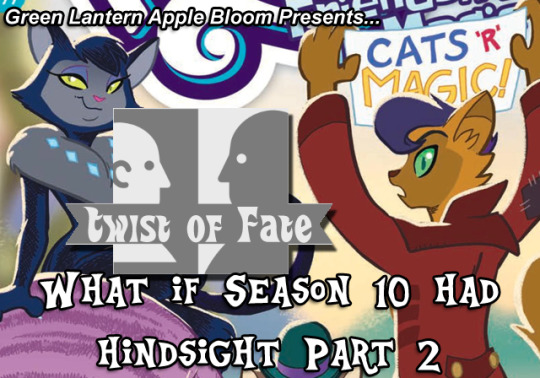
You’ve seen the review, now let’s see if I could improve it...
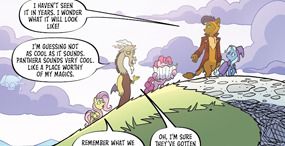
So most of the beginning is the same. The guys arrive at the Capital, Discord promises not to use Chaos Magic. But instead of seeing a big sign saying No Magic or Visitors, they see a crowd of cats. When they try to introduce themselves, they begin to panic and rush into their homes and any buildings they could. This is not because of anything the Ponies or Discord did, it's because they recognize Capper.

Fluttershy wonders how they could show them that they mean no harm but that’s when Trixie gets an idea. A few minutes later, Capper makes an introduction to Trixie’s Magic Show that makes the Cats curious to see what he is talking about. Discord is fussy because he thinks he can make a better show but Trixie’s Show does get them to open up. And that includes the current King.
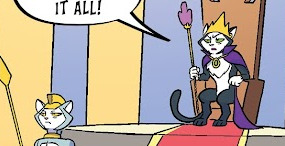
Seeing they seem to have no harm, the King invites them to meet. He informs them that he does recognise Capper and feared the worse because his old crew just became much worse than before. He doesn’t know how but that’s when they hear panic from the Street. It’s Capper’s Gang, but their eyes are all black. They’re causing mayhem and Fluttershy and the gang arrives to stop them.

Discord is finally allowed to go all out and tries to snap them into kittens, but nothing happens. That’s because during all his boasting, Shadow managed to sneak around and collar him. So Pinkie takes on Molly in a battle of explosions. Trixie and Admiral Fluffington go in a Third Person Off. Discord holds off Max because while he may not have his powers he’s slippery enough to avoid his strength. And Capper tries to talk Chummer out of doing this.
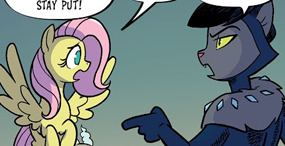
Shadow went to confront Fluttershy, thinking it was going to be easy, when Fluttershy uses the Stare on her. This causes Shadow to suddenly act differently. Far away from here, Morrigan is having difficulty since the Stare is counteracting her controlling magic. So when Shadow is finally free, she commands the others to escape. That’s when Fluttershy and the others find out about the Knights of Order to end the first issue.
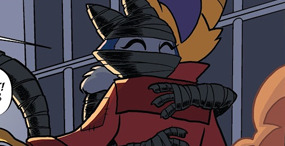
Issue 2 will begin with Shadow explaining to the King and others what happened. They were just doing their usual thing when Chummer and another showed up. This creature called Morrigan casted a spell on them making them do everything she wants. And what she wants is to make Abyssinia fearful of everyone. Discord is still stuck since nobody can pick a lock like Admiral Fluffington can. So they think Fluttershy could free the others if given the chance.
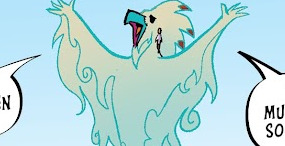
Back with the others, Morrigan tells an unknown person (Danu) what happened. Fearing the worst, he tells Morrigan to just possess everyone. Shadow and Capper talk about what happened to each other after the Storm King. Capper wonders how Chummer survived that crash. But that’s when they hear screaming. They look and they see a new creature they never saw before. Shadow confirms that’s the one controlling them.

Morrigan is possessing everyone while those under her spell are rounding up the others. That’s when our heroes come in. Morrigan begins to try to possess them when Fluttershy counters with the Stare. It’s a struggle that seems to stop the Possessed from doing anything. That’s when Capper hugs Chummer. He forgives him for the betrayal and wishes that they can just start over and be friends again. This gets through to Chummer and he hugs back.
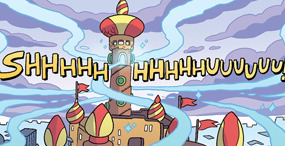
This activates the Magic of Friendship between the two and it spreads to all of the Capitol. Everyone Possessed was freed and showed magic. They hoped this meant Morrigan was stopped. But to their surprise, she blocked the Wave of Magic by encasing herself in a shield of Harmony Magic. Seeing she can’t win now, she escapes. Capper stays so he can get reacquainted with his old friends as the rest return to inform Twilight of this new information.
3 notes
·
View notes
Text
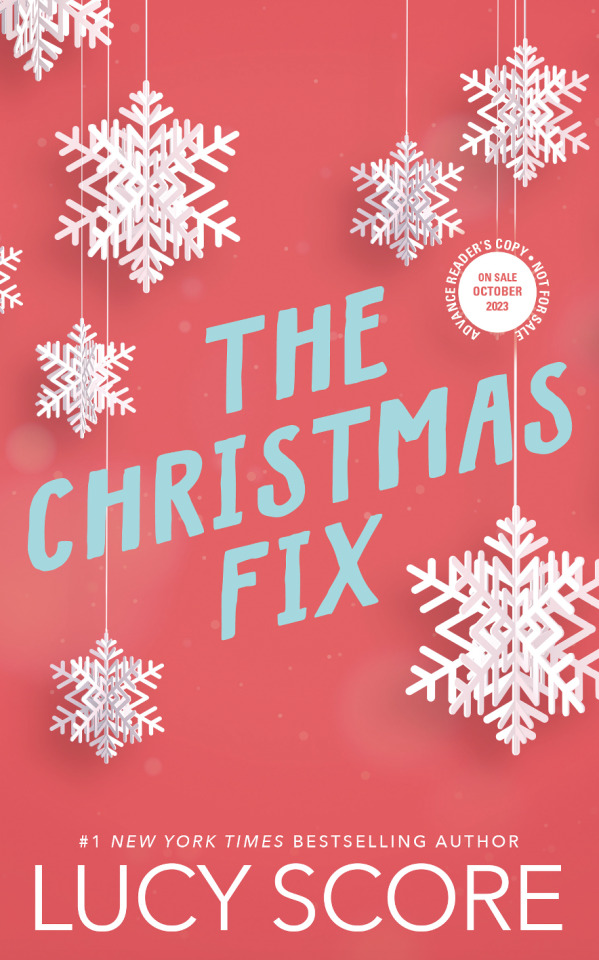
Rating: 2.5/5
Book Blurb: She'll save Christmas just to spite him…
There's only one thing standing in the way of Cat King saving Merry, Connecticut's Christmas festival: Grumpy town manager Noah Yates.
Single dad Noah takes his responsibilities seriously. When a late season hurricane turns his town into a disaster, he's left scrambling to pick up the pieces of the town he loves.
At least, until home renovation expert and smoking hot reality TV star Catalina King arrives with a camera crew and a budget big enough to put the town back together again. But Noah doesn't want a celebrity diva capitalizing on their tragedy or filling his young daughter's head with visions of glitz and glam.
Blonde bombshell Cat is used to being underestimated, but Noah has an uncanny knack for getting under her skin. They can't be in a room together without rubbing each other the wrong way…except that time in the dark alley where the rubbing was just right. Can these enemies work together to pull off a Christmas miracle or will their fighting leave them both on the naughty list?
Author's Note: These enemies-to-lovers deliver the holiday feels with a dirty-talking hero, ballsy blonde who never backs down, steamy hot break-the-dining-room-table sexy times, and a small town that still believes in the magic of Christmas.
Review:
She's a reality TV star who wants to save a Christmas festival and he's the grumpy town manager who wants her as far away as possible from his town. Cat King wants to save Merry, Connecticut's Christmas Festival, especially after the flood that had damaged the town. She wants to help the town rebuild, get the festival back in time, and put it all on tv to help raise money, the only issue is that the grumpy town manager, Noah Yates wants her as far away from possible and wants nothing to do with her show. Noah is a single dad who wants to be a role model to his daughter and to rebuild his town after the hurricane season wrecked it. He does not want Cat to make his town look pathetic on her tv show, he does not want her anywhere near his town, he doesn't trust her but he doesn't have a choice in letting her go ahead with her show because he so desperately needs the funds to help rebuild. Cat is dangerous for Noah, she's beautiful, famous, and gets under his skin. Noah and Cat get off on the wrong foot except their animosity towards each other might fuel another emotion, lust. One kiss and suddenly they can't stop wanting each other, and it's going to take a Christmas miracle to fix Merry and to figure out their feelings for one another. This is a Christmas romance between a feisty actress and a grumpy town manager. Cat and Noah are an enemies to lovers trope romance, yet if I'm going to be honest, I really didn't feel anything for them and didn't really get their romance. They both felt a bit immature (though to be fair, Noah is way worse, seriously I was fed up with this man the entire book). It didn't feel like a Christmas romance and I kind of wish there was just more holiday or more emotional storyline. I found myself just getting a bit bored with the story but managed to get to the end. While this one didn't work for me if you enjoy enemies to lovers with a bit of reality tv show mixed in give this one a go, it might be for you!
*Thanks Netgalley and SOURCEBOOKS Bloom Books, Bloom Books for sending me an arc in exchange for an honest review*
2 notes
·
View notes
Text
It's because actual quality requires management and shareholders to let go of the product's production and let the people actually working on it decide what's a good idea and what's a bad idea. You can't abuse and overwork your employees into making something that's actually really good, but you can abuse and overwork your employees into making something that's okay enough to keep some players invested long enough to shove microtransactions and overpriced DLC that should have been part of the base game down their throats.
The former requires that the people in charge actually let their workers use their expertise and have a healthy working environment and work/life balance, while the latter lets the people in charge continue to be abusive assholes while still making some money.
There's also the fact that CEOs and shareholders don't actually know or want to know about the things their companies make and how to make them well, nor do they care about market diversity. They want- need, even, because of how capitalism works- to have all the money now, and all they know are data points. So they see a video game that's wildly popular and rather than actually examining the player reviews or popular sentiment among users, they take the bare basics of the new game's mechanics and staple it onto something they know also sells well, if not just make a bare-bones copy with the aesthetics and basics of the thing players love but none of the actual quality or the tiny tidbits that make it work. Hence why so many games have crafting mechanics stapled onto them after Minecraft got popular, or why so many shooters hyperfocus on multiplayer (while not even maintaining a healthy user community by banning bots and toxic players). And of course, every few years there's another big wave of copycats trying to ride on the coattails of something else, like the MMORPG boom, the crafting boom, the GTA boom, and of course booms for first and third person shooters, and every single time the vast majority of titles trying to ride the coattails of something that was wildly successful end up dying out or fading into obscurity.
Sure, everyone knows about World of Warcraft, and plenty know about Final Fantasy 14, but who here remembers Rift? DC Universe Online? Dungeons and Dragons Online? The Lord of the Rings Online? Maplestory? Star Wars The Old Republic? (FYI, all of these are still playable today)
Sure, everyone knows Call of Duty, but who here remembers Transformers War For Cybertron? Star Trek Voyager Elite Force? Serious Sam? Star Wars Dark Forces?
Everyone remembers Mario 64 and Sonic Adventure, and lots remember Jak & Daxter and Ratchet & Clank, but who remembers Ty the Tasmanian Tiger? Chibi-Robo? Tak and the Power of Juju? Gex? Ape Escape?
And heck, Pokemon has totally eclipsed nearly every single other franchise like it; Digimon is often seen as "that thing that tries to be pokemon but computers" (which it really isn't, it's older than pokemon and started out as a virtual pet, but some of the video games tried to be more like pokemon), and some hardcore fans still care about Shin Megami Tensei and are happy it got another release (again, predates pokemon), but who here remembers Medabots? Spectrobes? Dragon Quest Monsters? Dinosaur King? Monster Rancher? Zoids?
And I can go on! This is not a comprehensive list of these copycat games (many of which good on their own merits!), nor of the game booms that keep happening. And most of these games/franchises I listed ranged from fairly high quality to at least decent, it's just that they never got the popularity that the name-brand games of the same genre did. And we've seen in recent years that indie games have become wildly popular by trying to recreate many more niche genres, such as Project Zomboid being a true survival game, Stardew Valley being Harvest Moon/Story of Seasons but slightly less idealistic, and of course Minecraft, The Binding of Isaac, Celeste, Hollow Knight, Cuphead, Undertale, etc. And these all get so popular because they either try new things or polish an older but relatively niche genre until it shines. And that's something big companies typically refuse to do, because the ones in charge refuse to accept that they don't know what they're doing.
Baldur's Gate 3 owes at least some of its success to building off of decades of other CRPGs and utilizing one of the most popular tabletop gaming systems of all time (Dungeons and Dragons), but honestly, most of its popularity comes from the well written characters, the intriguing plot, the actual roleplaying aspect that makes dialogue feel like more than simply clicking an option, and the sheer variety of things you can accomplish in combat if you're paying attention or come up with something clever. It is, simply put, really polished, and that sort of attention to detail and love for what you make shines through, made all the better thanks to the high production value and Larian Studios having a ton of experience making CRPGs. And that scares most big studios' execs, because BG3's wild popularity means that players have tasted genuine passion and quality and attention to detail in a new high-budget game for the first time in years, and we don't want to settle for the same cookie-cutter generic repetitive junk big companies have been insisting is the best they can do.
The way Triple A game developers are reacting to Baldur's Gate 3 being seemingly an amazing game with no microtransactions reminds me of the reaction Triple A game developers reacted to Elden Ring being an amazing game with no microtransactions, which to me, is hilarious, because you'd think the reaction to seeing something groundbreaking and that's clearly beloved by the people who love and are immersed in the artform would be "Wow, incredible... Maybe we can learn from this and make a breakthrough, maybe we can redouble our efforts and take this as reference to make something fantastic ourselves!" and not "Well, You See, this game is bad for the industry because it's TOO good and it creates an expectation of quality and love (and no microtransactions), do not, my friends, become addicted to good video games. It will take hold of you, and you will resent their absence!"
10K notes
·
View notes
Text
Week in Review
01/12/2025 – 01/18/2025
Sunday
Week 49 of missing Cipher Academy
The Pit of 100 Trials is pretty fun because I got to just zone out and listen to YouTube videos while going through each floor and Tattling all the enemies. The Gloomtail fight got a little dicey, but I managed to pull through without having to start the whole dungeon over.
Monday
I did the Pit of 100 Trials again to destroy that little blue thing (I employed my Prince Mush method and cheesed it with a million charges), collected all the badges, and went on an insane shopping spree complete with a spreadsheet checklist to get all the recipes…and man, how the hell were players supposed to figure out all these esoteric combinations without a guide? I can’t be too mad, though, because it was fun shopping around and I always love putting a spreadsheet together. Like I said in last week’s Week in Review, in the end TTYD was just decently fun for me, but it wasn’t anything especially mindblowing. I’ll give it a 7/10, and now I’m just really looking forward to replaying Origami King.
I was still in a video game mood, so I decided to go through most of the short free indie games I have saved on my laptop (much like I did about a year ago). First up was South Scrimshaw: Part One, a nature documentary style kinetic novel about alien whales. I really quite liked this one – the writing and the voice acting perfectly captured that documentary vibe, and all the art was gorgeous and a delight to look at. I especially loved the skeletal and other biological diagrams…the amount of detail and thought put into everything is amazing. I really fell in love with this little alien whale creature and its fascinating life cycle, and I can’t wait to see the conclusion in Part Two. 7/10
Then I played through 31st March, Midnight, but the writing voice was so cliché and amateurish that it was genuinely kind of a struggle to get through. It just has that “well THAT just happened” energy to it that I find off-putting, but I finished it anyway because it was so short. I honestly kind of wish I didn’t – as someone who already knows about the pitfalls of rainbow capitalism and respects visual novels as a medium, I was definitely not the target audience for this entire treatise about those topics with the punchline being that the game the protagonist is working on is one of those corporate April Fools visual novels. So to me it just read as painfully preachy and frankly a little annoying, so I’m sorry to say that I really didn’t have a good time with this one. 1/10.
Married in Red was a fun little “puzzle solving” game, I guess, with the puzzle in question being selecting the right options to get away with murder. But because it’s a game jam game, the story was fairly basic and reliant on well-trod and basic story beats. Nothing that happened particularly surprised me, but it was so short that I can’t really say it was a waste of time. It was just okay, I suppose. 3/10.
Biocatalyst had great art direction and atmosphere, but the writing was just so cheesy and generic. The big bad was already stereotypical enough, but then to throw in a casual line about how these three men managed to take down a mega pharmaceutical corporation in a single year just took me out of it completely and into the realm of utter fantasy. With how easily these three got their happy ending, it just cheapened the already tenuously basic moral dilemma that the ghost presented them. But whatever, they just wanted a simple and complete story so it’s fine. I guess I just wish the writing would live up to the fantastic character designs. 4/10.
I really gotta stop playing these short game jam horror/mystery games, man. There’s just never enough time for the writing to breathe and have anything interesting to say.
Tuesday
I finally trapped my friend in my house and sat her down to watch Malcolm in the Middle with me. Alongside Succession, Malcolm is one of my favourite TV shows of all time (which should say something about my fondness for dysfunctional families, I suppose). But whereas Succession ultimately leans into the Shakespearian tragedy, Malcolm in the Middle is just fun times throughout with a core of real familial love at its center. I’ve rewatched this show all the way through maybe like three times at this point in my life, but I’m always excited to watch an episode even when I know almost everything that’s going to happen. I just love this show so so so much. We watched the first three episodes today, and everyone was so cute…and even though some of the foundation was still a little shaky, I love that you can see the central thesis of the show shining through since day one. I’m so sad that Linwood Boomer never made anything else besides this show, but at least we got Malcolm in the Middle as his magnum opus. Luckily my friend ended up enjoying Malcolm too, so these are going to be a fun few months as we watch it together.
Wednesday
Whoops
Thursday
Oops
Friday
It’s Drag Race Friday and it’s a ball episode, which always makes my Project Runway-loving ass happy. The theme was pretty fun, and I liked seeing the queens just hang out and chat with each other. I thought the drama between Jewels and Onya was a little silly, but the incident between Hormona and Lexi was pretty amusing, and it all made for a solid episode. I also think Arrietty should’ve won over Sam, but whatever.
God dammit I tried to read the JK Haru light novel but the writing/translation was so awkward and stilted and lacking any sort of character that I couldn’t bear it and gave up immediately.
Saturday
Whoops again
0 notes
Text
AI Paves a Bright Future for Banking, but Responsible Development Is King
New Post has been published on https://thedigitalinsider.com/ai-paves-a-bright-future-for-banking-but-responsible-development-is-king/
AI Paves a Bright Future for Banking, but Responsible Development Is King


AI has become ubiquitous. A post-pandemic appetite for greater efficiency, responsiveness, and intelligence has fueled a competitive race among the world’s leading tech players. In just the last few years, AI has grown from an emerging fringe technology for highly-specialized use cases to something easily accessible through any connected device. In fact, 33% of all venture capital investments through the first three quarters of 2024 went to AI-related companies, a significant increase from 14% in 2020. This has translated into quick, almost feverish adoption of AI systems into core business functions and applications for consumer use.
Despite the eagerness of banking executives to adopt AI, its growth in the industry will be more measured. AI is expected to add between $200 and $340 billion in value for banks annually, primarily through enhanced productivity. 66% of banking and finance executives believe these potential productivity gains from AI and automation are so significant that they must accept the risks to stay competitive. However, stringent regulatory standards and the high stakes surrounding consumer data still mean banks must approach AI thoughtfully, focusing on security and reliability.
Integrating AI technology is steadily reshaping banking, promising improvements in usability, operational efficiency, and cost management – all of which are crucial to keeping banks competitive and customer-centric in an evolving digital economy.
AI serves as the catalyst for innovation in banking by simplifying this sector’s complex processes while improving efficiency, accuracy, and personalization. This impact is especially evident in areas like customer service, fraud detection, and credit decision-making. AI chatbots, for example, are now commonplace – with 72% of banks reporting improved customer experience due to their implementation.
Integrating natural language processing (NLP) is particularly valuable, allowing for more intuitive customer interactions. In cases where a customer might need support with online platforms, AI can respond in real time, providing customers with instructions in plain, simple language. This can improve the user experience, making otherwise intimidating banking services more approachable and user-friendly. Moreover, by analyzing customer data and transaction history, AI-driven platforms are becoming better at offering personalized product recommendations. For example, if you made an investment transaction from one bank to another, you might see a commission-free trade offer from one of those banks on your transactions page. These kinds of personalized offers can boost customer loyalty, but it seems the banking sector has a gap to fill, as 74% of banking customers say they want more personalized experiences. Banks should take this as a sign to adopt AI to bolster personalization, especially at a time when banks are losing 20% of their customers due to poor customer experience.
The benefits of AI systems extend beyond front-office improvements; they make back-office processes significantly more efficient. Financial institutions have leveraged AI to reduce time-intensive manual reviews and mitigate risks. For example, JP Morgan’s Contract Intelligence (COiN) platform can process 12,000 contracts annually, which saves the firm’s legal teams 360,000 hours of reviews. This platform has been especially helpful for interpreting loan applications.
AI emboldens risk mitigation and fraud detection
Beyond enhancing customer interactions and making contract approvals more efficient, AI technology also bolsters banks in fraud detection and risk management strategies. Last year, fraud cost global banks more than $442 billion in projected losses, most from payments, check and credit card fraud. AI technology significantly advanced fraud detection by recognizing patterns that might indicate fraudulent activities. These tools can also monitor transactions in real time and flag anomalies far faster than traditional methods. For example, AI-driven underwriting tools help banks assess risk in merchant services by analyzing transaction histories and identifying potential red flags, enhancing efficiency and security in the approval process.
While AI has made significant strides in fraud prevention, it’s not without its complexities. The rise of generative AI tools, capable of creating deepfake videos and images, adds new layers of risk. They can be exploited for identity theft and other sophisticated scams – like the finance worker who was tricked into paying out $25 million to fraudsters using deepfakes to pose as his chief financial officer.
As AI-driven fraud detection systems improve, the frameworks governing their use must also evolve. Encouragingly, financial institutions are increasingly collaborating with regulators to ensure these AI systems are designed and deployed responsibly, with a strong focus on customer protection.
Managing ethical and regulatory challenges
Despite its many benefits, AI adoption in banking comes with substantial ethical and regulatory hurdles. Given the heavy regulatory landscape in banking, financial institutions face strict compliance standards, often which vary by region. The European Union, for instance, is set to implement its AI Act, which includes fines of up to 7% of annual revenue for a company found to be non-compliant. Similarly, in the United States, regulatory oversight from bodies such as the Federal Reserve and the Consumer Financial Protection Bureau (CFPB) means banks must navigate complex privacy rules when deploying AI models.
A critical regulatory concern with AI is the risk of bias in large language models, which can have unintended consequences with credit scoring or loan approval decisions. For example, an AI model trained on biased or flawed data could disproportionately reject loan applications from certain demographic groups, potentially exposing banks to reputational risks, lawsuits, regulatory action, or a mix of the three.
To address these issues, banks are investing in “explainable AI” frameworks that allow for greater transparency in AI-driven decisions. Explainable AI provides insights into how AI models make predictions, helping banks demonstrate accountability to regulators and customers. It’s also crucial that banks maintain “human-in-the-loop” strategies to override decisions made by AI, particularly if they believe AI decisions could lead to disciplinary actions.
Moreover, ensuring data security and customer privacy in AI applications is critical as banks handle vast amounts of sensitive information. AI-driven systems must incorporate advanced encryption and data anonymization to safeguard against breaches. The average cost of a data breach in financial services is $4.45 million per incident – a cost that AI can potentially mitigate, provided it is implemented with other robust security measures.
The need for responsible AI development
Every few weeks, a new development in AI technology seems to make headlines, raising the important question: are these advancements grounded in responsibility or are they being purely driven by financial incentives? A responsible approach to AI development is paramount to fully capitalize on AI, especially for banks. This involves continuous monitoring, testing, and adjusting AI models to ensure they operate as intended. A well-rounded AI strategy includes rigorous model validation, bias detection protocols, regular audits, and most importantly, cleansing data. Furthermore, AI systems should be designed to augment human oversight rather than replace it, especially in complex decision-making scenarios. This approach ensures that AI serves as a tool for empowerment, allowing banking employees to focus on tasks that require critical thinking, empathy, and customer interaction.
Creating a balanced path forward
AI’s potential to revolutionize banking is undeniable, but the path forward requires careful consideration of technological and ethical needs. Banks are uniquely positioned to lead the responsible adoption of AI, setting the standards for other industries on how to integrate innovation with accountability. By focusing on transparent, compliant, and customer-centric AI models, financial institutions can transform the banking experience, offering more efficient services without compromising trust or regulatory adherence.
Looking ahead, the successful adoption of AI in banking will depend on collaboration across the industry. Banks, regulators and technology providers must work together to establish best practices, share insights, and adapt to a fast-moving landscape. As banks navigate the complexities of AI, those able to harness its potential while managing the risks will undoubtedly emerge as leaders in the future of finance.
#000#2024#ADD#adoption#ai#ai act#AI adoption#AI chatbots#AI development#ai model#AI models#AI strategy#AI systems#ai tools#anomalies#applications#approach#automation#bank#banking#banks#Bias#billion#breach#Business#catalyst#chatbots#Collaboration#Companies#compliance
0 notes